

LEXINGTON ROAD
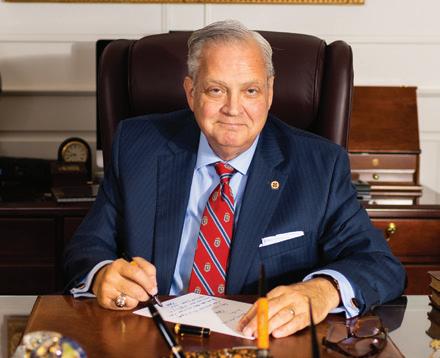
MR. ALBERT MOHLER, JR.
PRESIDENT’S MESSAGE
ore than 40 years ago, sociologists Peter and Brigette Berger warned us with their book title, The War Over the Family. Unlike most of their academic colleagues, the Bergers defended what was then called the “middle-class family,” meaning father and mother and their children in a household. Even that long ago, the Bergers warned that the family was besieged by enemies, ranging from an aggressive state to a regime of “experts” to radicals who wanted to deconstruct marriage and family altogether.
They were quite right back then, and even prophetic. Read today, some of their warnings seem almost outdated. The world has simply moved on and that means the subversion and marginalization of marriage and the family as permanent facts. Or so the revolutionaries claim.
But here we are, well into the twenty-first century, and the war over the family continues. Newsweek magazine recently ran a cover story that claimed to explain “why fewer people than ever want to get married and have children.” Singleness now seems quite attractive to many people, especially young adults, and a good portion of that generation has decided to forego marriage, children, and the whole package. The sexual revolution allows — even celebrates — sex outside of marriage and sex without children on the horizon. Our society has even declared the impossible to be legal, with same-sex marriage and other distortions of creation order to be celebrated. Christians are now called to lead a counterrevolution against the promiscuity, venality, and
sterility of the age. Thankfully, Christians are doing just that. Deeply committed Christians are marrying, having children, and recovering a deeper foundation for love, marriage, children, and the full promise of marriage and the family.
We are witnessing a very strange phenomenon. If you look for babies and children, look at the theological pattern. Who is marrying and having babies? If you are looking for young people headed for marriage, recently married young couples, higher birth rates, and lots of strollers, look for a conservative Christian church or come to Southern Seminary and Boyce College. The young men and women drawn to Boyce College aim for full faithfulness and, driven by love of Christ, they want it all, and all in due season. They learn among seminary students who, just a bit older, tend to be married and eager to build a family.
All this is based in faithful Christian teaching and a biblical vision. Conservative Christians are now the true counter-culture, and it shows up on this campus. Today, I looked out the big windows in my office and saw the Seminary Lawn filled with college students playing games, walking the square, and studying for finals. Seminary students were doing the same, except many of them were also pushing strollers and holding tiny hands as they walked.
I see the glory of God in that beautiful picture, and I pray to see that same glory throughout the rising generation of young Christians. We now have to fight — and thank God — for what previous generations of believers took for granted.
Welcome to this first edition of Lexington Road. I hope you find it to be encouraging, instructive, thoughtful, and inspirational. We hope that this representation of Southern Seminary and Boyce College will be of lasting value to you. We mean it as an encouragement from Lexington Road, where you are always welcome.
The beautiful cover art features Martin Luther, the great reformer, with his children. Luther, a former monk, married Katerina, a former nun, and together they established a gospel family, filled with joys the young Luther could never have imagined. When the Luthers’ first-born son, Hans, arrived, Luther stared at him in wonder and said: “Kick, little fellow. That is what the pope did to me, but I got loose.”
Their home was a home of worship, love, and joy. It was also a house of music, and this art depicts Luther making music with his precious family. This entire magazine is an effort to underline the seriousness with which Southern Seminary and Boyce College take our charge to serve the church. In the name of Christ, we press on.
INTRODUCING LEXINGTON ROAD
Lexington Road is a new resource from Southern Seminary and Boyce College—named for the road our campus has called home since 1926. From this place, faculty have trained generations of church leaders with biblical truth and theological clarity. This resource continues that legacy, offering timely articles that equip the church and reflect the kind of biblical conviction and theological clarity essential for faithfulness in all of life— so that the people of God “may be perfect, throughly furnished unto all good works” (2 Tim 3:17).
FEATURED


Spring 2025
Copyright © 2025
The Southern Baptist Theological Seminary
Vice President of Communications and Managing Editor: Jacob Percy
Creative Director: Samantha Rice
Chief Style and Copy Editor: Torey Teer
Copy Editor: Hannah Miller
Designer: Anna Vanden Brink
Production Manager: Drew Watson
Photographers: Mark Schisler, Kelsie Keeter
News Writer: Travis Hearne
Subscription Information: Lexington Road Magazine is published by The Southern Baptist Theological Seminary, 2825 Lexington Road, Louisville, KY, 40280. The magazine is distributed digitally at equip.sbts.edu/magazine. If you would like to request a hard copy, please reach out by emailing communications@sbts.edu.
Mail:
The Southern Baptist Theological Seminary, 2825 Lexington Road, Louisville, KY, 40280 Online: sbts.edu
Email: communications@sbts.edu
Telephone: (502) 897-4000

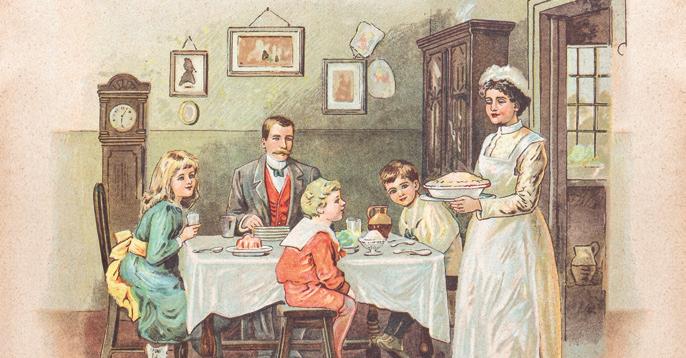
T. Walker
by Andrew
A Display of God’s Glory: The Christian Family and The Order of Love by R. Albert Mohler, Jr.
Spotting Stupidity by Jeremy Pierre
Gospel at
Dinner Table: Hospitality as Mission by John Klaassen
12 The Bridegroom and the Bride: How Marriage Foreshadows the Gospel by Mitch Chase
22 Porn is a Lie. The Gospel is True. Your Son Needs to Know This. (And Your Daughter Does, Too.) by Curtis Solomon
28 The New Testament Case for Godly Fathers by Rob Plummer 32 Family-as-Church, Church-as-Family by Timothy Paul Jones
From Strangers to Siblings: the Power of Brothers and Sisters in Christ by
Spiritually-Focused
Builds
Click with Caution: How Technology is Discipling Kids by Jason Thacker
Biblical Parenting is Not Merely Behavior Modification by Jimmy Scroggins
74 A Conversation with Abigail Shrier and Albert Mohler Bad Therapy, Cultural Seduction, and Children in Crisis
A Conversation with John-Michael Bout
Into the Light Equips the Church to Fight Pornography
FOUNDATIONS
And God blessed them. And God said to them, “Be fruitful and multiply and fill the earth and subdue it, and have dominion over the fish of the sea and over the birds of the heavens and over every living thing that moves on the earth.
GENESIS 1:28

A Display of God’s Glory: The Christian Family and The Order of Love
by R. Albert Mohler, Jr.
Books for children tell the story. Look back just a few decades and children’s literature is constant on the theme of the family. Family order and family structure are fundamental. So fundamental, in fact, that father and mother and brother and sister are essential to almost every story or absolutely clear as background realities. In larger stories we gain an uncontested picture of the extended family. There are grandparents and aunts and uncles and cousins and assorted relations who help the child to know who he is, and to whom he belongs.
Fast forward to recent times, and books for children feature two daddies, two mommies, gay uncles (“guncles”), and any number of innovations. Other families include a variety of blended options, which may or may not require any connection by marriage. That most basic institution of
human life, marriage, has been the focus of intense cultural transformation and manipulation to serve the cause of sexual revolutionaries. If they can redefine marriage, they redefine the family. And if they can redefine the family, they will transform the entire society. This is the battle that matters most, and the revolutionaries know it.
When the society around us defined marriage and the family in biblical terms, the inheritance of centuries of Christian influence was clear. Common grace and holy Scripture revealed and affirmed marriage as the monogamous union of a man and a woman, fully open to the gift of children and prepared to prepare those children for productive adulthood, which would mean taking their own places as the mothers and fathers of the future.
But the age of the commonly shared understanding of marriage and the family is now over. We now live in the age of moral rebellion, sexual anarchy, endless experimentation, and birthrates that imply sterilization. We have turned the order
All true Christian thinking begins with the one true and loving God, and the Bible opens with God creating the heavens and the earth. Creation displays the glory of God, and the order of creation reveals the order of God’s glory.
of the family into pandemonium and, having sown the wind, we now reap the whirlwind.
In the wake of all this, Christians have been forced to recover fundamental forms of Christian thinking and make new arguments, even to ourselves and our own children, that reinforce what we know to be true about marriage and the family. When the culture agreed with us, such forms of thinking had gone into eclipse — but always there for use when needed. Well, these forms of Christian thinking are urgently needed now, and Christians must waste no time recovering them. If not, we will lose all grounding and follow society’s path to corruption. So, how do we recover those lost principles and way of understanding?
The impulse to go backwards in time is understandable, for many of us can remember a time when the society around us largely agreed with us. But nostalgia will not do, if only because that older consensus has broken apart precisely because it is no longer held together by truth. If the family is just a social convention, then the revolutionaries can have it. If nostalgia is all we have on our side, we do not stand a chance. Thankfully, the foundation of Christian thinking is not nostalgia or a simple hunger to return to the past.
To the contrary, we must go much further back — all the way to God’s creation of the cosmos. Our Christian impulse is to turn to holy Scripture, and that is absolutely right. But the
Bible directs us back to creation, and an understanding of Creation Order is absolutely foundational.
All true Christian thinking begins with the one true and loving God, and the Bible opens with God creating the heavens and the earth. Creation displays the glory of God, and the order of creation reveals the order of God’s glory. The Creator loves what he has created, and he creates what he loves. In the very first chapter of the Bible, the opening chapter of Genesis, Scripture reveals that on the sixth day God created human beings in his own image: “So God created man in his own image, in the image of God he created him; male and female he created them” (Gen 1:27).1 The man and the woman are created in the image of God, setting them apart from all other created beings. They are created male and female, man and woman, and this is integral, fundamental, and clear in God’s plan. Having made them, God then blessed them and assigned them dominion over the fish of the sea, the birds of the air, and “over every living thing that moves on the earth” (Gen 1:28b).
But there was a prior command, and that command is, “Be fruitful and multiply and fill the earth” (Gen 1:28a). The command is for a man and a woman to marry and then to reproduce successive generations of image-bearers
1 Unless otherwise indicated, all Scripture quotation will be from the New International Version.
who will fill the earth with God’s glory. In some sense, God gave a reproductive charge to all his creatures. They also fill the earth to God’s glory, but they cannot fill the earth with God’s image-bearers. Only humans may do that, and that is our first and most fundamental charge.
The Bible does not just imply an order for the family; it commands such an order. Our task is to obey the Creator and to obey his commandments, and in creation order, those commandments start with a man and a woman in the covenant commitment of marriage, bringing fellow image-bearers into the world as children.
Properly understood, everything else follows from this basic teaching of creation order. Marriage, later defined as a covenant union, is there. Male and female as objective categories are there. We do not decide or discover our sex or gender, for it is revealed in our bodies. The organs that make us male and female are fully present as promised, and with the body and its promise comes an assignment and a destiny. It is a boy or it is a girl. All it takes is eyes to see. The boy is the promise of the man, and thus the promise of husband and father as well as son. The girl is the promise of the woman, and thus the promise of wife and mother as well as daughter. Marriage and the pledge of procreation are implicit in our creation as man and woman. Identities are complementary male and female assignments with promises, not impositions, experiments, or impositions. They are gifts.
The gifts come to fullness, and with that fullness comes the promise and duty of procreation and the glad welcome of children. Those children are to be raised in the nurture and admonition of the Lord, and they are to be seen as both a gift and an obligation. Christians understand that children are to be loved and protected and corrected. They are to be raised by Christian parents whose marriage is itself a demonstration of the covenant bond, and they
are to be presented with the gospel and taught the Holy Scriptures.
The rightly ordered family is not merely a matter of biblical truth and Christian duty, for it is also an incubator of faith and a nursery of the gospel. It displays the glory of God in a fallen world and, though imperfect, it is both a testimony to truth and “a haven in a heartless world.”
By God’s design, the natural family is the central unit of human society, and that society is to respect marriage and protect the family from intrusion and subversion — and that includes the intrusion and subversion that may come from the modern state. To state such clear biblical truths is to ignite controversy in this age, but every functional human society has recognized a duty to honor marriage, encourage procreation, and respect the integrity of the family. The modern secular state is failing at all of these duties. Yet, even as the world around us defies reality at great cost, the Christian church must not join in that defiance.
Oddly enough, an important principle of Christian teaching on these questions emerged in recent months when the concept of the “order of love” hit some headlines, sparked by a comment by Vice President J. D. Vance. Speaking of a ranking of priorities, the vice president referred to Augustine and his notion of the “order of love” (ordo amoris) or “rightly ordered love.” We live in an age marked by distorted love that recoils in horror at the very idea that love could be wrongly ordered. But, as Augustine wisely observed, Christians must “observe right order even in our love.”2 Right order means that love of God must be our primary and our highest love. Beginning with any other love leads to disaster. But, after love of God, we are to love those who are lovingly created in
2 Augustine, The City of God against the Pagans, ed. and trans. R. W. Dyson (Cambridge: Cambridge University Press, 1998), chap. XV, sect. 23, page 680.
his own image, and that means all human beings. As our Lord famously taught, every living person is our neighbor, and we owe respect and proper love to every fellow human being.
At the same time, ordered love also comes with ordered responsibility and personal relationships, with marriage and family at the top of that earthly order. God ordered his covenant nation and the church to honor father and mother. Parents are charged to care for their children, to provide for them, to nurture and discipline them in the gospel. We are to love all humans, but we owe covenant duties to our spouse. We are to honor the image of God in all persons, but we are to honor our own parents, and we are to care first for our own children. The order of love extends to larger kinship, grandparents and grandchildren, aunts and uncles, and cousins and beyond. Proximity becomes a vital principle, for a man who does not provide for his own household “has denied the faith and is worse than an unbeliever” (1 Tim 5:8). As Rusty Reno states rightly, “We’re to love with greater devotion those for whom we have greater responsibility.”3
Our own family is not the limit of our love, for we are to extend love, concern, and care to as many as we can. But we owe our first duty to those directly in our care, starting with parents and children. We are also called to love and help others, but that cannot be honorably done if we do not first love and care for those first assigned to us. The principle of ordered love underlines the truth that if marriage is not respected, nothing else in society will be respected. If the natural family is not honored, nothing else will be honored. Those who insist that love is not ordered become the agents of disordered love. And, make no mistake, disordered love is now celebrated
3 R. R. Reno, “JD Vance is Right about the ‘Ordo Amoris,’” Compact, accessed April 25, 2025, https://www.compactmag.com/article/ jd-vance-is-right-about-the-ordo-amoris/.
in our society. Christians understand why that spells inevitable disaster.
The controversy over ordered love reveals something of the confusion and corruption of the age, but it also points to a wonderful opportunity for Christians. When we live by rightly ordered loves, beginning with love of God, and when we are good stewards of creation order given by the Creator, we simultaneously reap the blessings of God in marriage, family, children, and the larger circle of family love, even as we reveal the glory of God’s design. We extend that love, in right order, to our brothers and sisters in Christ in the local church, to whom we owe particular duties, and then to the larger family of Christians around the world. Beyond the family and the church, we owe our first duty to fellow persons and families in our own neighborhood and community. Obeying Christ, we understand that no border limits our duty, but we owe our primary duty to those assigned to us. Otherwise, everything falls, and human society fails.
In this strange and challenging age, we have to push hard against the modern concept that marriage and family are subject to redefinition by the sexual revolutionaries. We are called to show the world what it means to welcome children into the world and find unspeakable joy in the home, even in the sweet but strenuous task of raising children. We are to show the Creator’s glory in this world even as the culture around us sinks into confusion and dissolution. Our love of Christ compels us to seek and display the glory of God in the ordered love of the Christian family.
“At the same time, ordered love also comes with ordered responsibility and personal relationships, with marriage and family at the top of that earthly order. God ordered his covenant nation and the church to honor father and mother.”
BY R. A LBERT M OHLER
The Bridegroom and the Bride: How Marriage Foreshadows the Gospel
by Mitch Chase
“And they lived happily ever after.” That line is a classic fairy-tale ending, though the stories themselves may have been filled with conflict and uncertainties along the way. It is an ending that brings the reader relief and satisfaction. There is something appealing about a resolution that is not only peaceful but also joyful— happily. And there is something reassuring about a joyful state that is not merely temporary but unending— ever after.
The biblical authors tell us that such an ending is not only for fairy tales. The present and future life for God and his people is covenantal communion, and it lasts as long as Christ’s love for his people lasts. God designed the covenant of marriage to portray the greatness, beauty, and goodness of the New Covenant relationship between Christ and his Church.
If we reflect on the marriage covenant in light of the Bible’s clarity and instruction
about it, our exultation in the gospel will deepen, and our understanding of the New Covenant will increase.
A Pre-Fall Paradigm
Reading the flow of events in Genesis 2, we see that the Lord took the man from the ground and then took the woman from the man (Gen 2:7, 21–22). When the Lord brought the woman to Adam, the man said, “This at last is bone of my bones and flesh of my flesh; she shall be called Woman, because she was taken out of Man” (Gen 2:23).
These words in Genesis 2:23 are the first words of speech that we read from Adam’s mouth. He had given names to livestock and birds and beasts (Gen 2:20), but the biblical author merely reports that the naming happened. The first words we have from Adam are words of poetic proclamation. Using the language of “Man” and “Woman,” Adam highlights the distinction between them. Using phrases like “bone of my bones” and “flesh of my flesh,” he highlights the unity they share.
The biblical author draws a conclusion from the scene and words of Genesis 2:21–23. He says, “Therefore a man shall leave his father and his mother and hold fast to his wife, and they shall become one flesh” (Gen 2:24). That conclusion helps us see what transpired when the Lord brought the woman to the man and the man spoke: we witnessed a marriage. The man and woman entered a covenant together before the Lord. And because of what the biblical author said in Genesis 2:24, we can discern that this first marriage served as a paradigm that instructed others about marriage.
The claim that Genesis 2:21–24 is both historical and paradigmatic is confirmed even in the New Testament. When some Pharisees approached Jesus with a question about divorce (Matt 19:3), Jesus’s answer invoked the pre-fall design of God. Jesus said, “Have you not read that he who created them from the beginning made them male and female, and said, ‘Therefore a man shall leave his father and his mother and hold fast to his wife, and the two shall become one flesh?’ So they are no longer two but one flesh. What therefore God has joined together, let not man separate” (Matt 19:4–6).
The man and woman are both different from the animals, and the man and woman are also different from one another. She was “a helper fit for him” (Gen 2:18). Nevertheless, together they were one flesh. This oneness was the result of complementary realities. Moses wrote, “And the man and his wife were both naked and were not ashamed” (Gen 2:25). Their nakedness made their biological and sexual differences obvious. These differences were real, and they were nothing to be ashamed of.
Genesis 2 introduces marriage and gives us a paradigm before the fall. We see the truths of sexual distinction and complementary. We see the truth of divine design and covenant unity. And because the conclusion of Genesis 2:24 would have been written after the fall, we learn that the paradigm in Genesis 2
is instructive and relevant for image-bearers outside of Eden. Marriage belongs to God, and he has entrusted us with it so that we might faithfully steward it for his glory.
Corrosion of the Covenant
Since all marriages now take place outside of Eden, we need to recognize how the marriage covenant has fared in a fallen world. Like metals that react to the environment, appearing rusted, weakened, and corroded, human marriages are affected by the presence of sin and death in the good world God has made. God’s gifts—such as marriage—face the corrosive effects of foolishness, mismanagement, selfishness, and distortion.
After violating the Lord’s command, yet still in the Garden of Eden, the woman heard the Lord say, “Your desire shall be contrary to your husband, but he shall rule over you” (Gen 3:16). Those words are not all the Lord said that day, but they are relevant to our subject of marriage because they identify the marriage relationship as a place where the struggle between sinners will be manifested. The blessing of complementarity would be challenged by distorted desires.
Genesis 4 reports how a man named Lamech (not Noah’s father) took multiple wives (Gen 4:19). Lamech’s marriages were the first instance of polygamy in the Bible, and many instances would follow. While the Bible recognizes these polygamous unions as actual marriages, these concurrent unions deviate from the Genesis 2 paradigm of one man who is married to one woman. Much trouble arises from these deviations. Narratives have their own ways of teaching truths to readers, and something readers can glean from biblical narratives about polygamous relationships is that polygamy is associated with difficulty, strife, grief, and disobedience. You can see several, and sometimes all, of these elements in the lives of Abraham, Jacob, David, and Solomon.
According to Deuteronomy 17:14–20, Israel’s king was to be an example of faith and righteousness, and one component of this example was not taking many wives (Deut 17:17). Instead, Israel’s king was to devote himself to the law of Moses, reading it and studying it and keeping it all the days of his life (17:18–20). Near the beginning of the Torah’s first book, the king would know God’s design for marriage and would have the responsibility to live in light of it.
One responsibility for a married couple is sexual faithfulness. In fact, sexual faithfulness in marriage is so important that it is addressed in the Ten Commandments. The seventh commandment says, “You shall not commit adultery” (Exod 20:14). If a husband or wife seeks sexual fulfillment outside their marriage covenant, the covenant is being violated.
God’s revealed will for sexual expression is male-female intimacy in the marriage covenant. That covenantal reality supplies the structure for a stable household in which children can be brought into the world and reared by committed parents. When image-bearers make decisions that go wayward from God’s will for marriage, the personal and social consequences are serious and far-reaching. The Israelites in the Old Testament needed to be aware of sexual temptations that would be present in the promised land. The Lord forbade the people from engaging in incestual, homosexual, or beastly activity, even though the Canaanites were guilty of sinning in those ways (Lev 18:24–30).
Disciples of Christ must be convictional and persevering in biblical sexual ethics, even though prevailing cultural winds are tolerant and supportive of all manner of deviations from God’s design. Sex has been separated from marriage, and the design of what marriage is has been under assault. For the sake of healthy discipleship, then, believers need to be grounded in the biblical and theological truths of what it means to be married in the eyes of the Lord. A
healthy and robust view of marriage will strengthen us personally, and it will bless others societally.
A Parable of Lasting Things
With the Genesis paradigm of marriage still reflecting God’s will, and despite the corrosive effects that sinners have had upon the beauty of marriage, Bible readers should pay attention to the metanarrative of Scripture. It is by looking at the marriage covenant through the wide lens of the Bible “big story” that we see the greatest significance God designed marriage to have.
Paul writes about this significance in his letter to the Ephesians. He said of the one-flesh marriage relationship: “This mystery is profound, and I am saying that it refers to Christ and the church” (Eph 5:32). In fact, Paul’s argument in that very chapter draws upon the greater truth of the Christ-Church relationship. He told wives, “Submit to your own husbands, as to the Lord. For the husband is the head of the wife even as Christ is the head of the church, his body, and is himself its Savior” (Eph 5:22–23). He told husbands, “Love your wives, as Christ loved the church and gave himself up for her, that he might sanctify her, having cleansed her by the washing of water with the word, so that he might present the church to himself in splendor, without spot or wrinkle or any such thing, that she might be holy and without blemish” (Eph 5:25–27).
Earthly marriage is meant to point to the ChristChurch relationship. The covenant of marriage, therefore, serves a temporary and parabolic purpose. In the new creation, there will be no human marriages (Matt 22:30), for the purpose of earthly marriage will be complete. Just as there is a marriage at the beginning of the Bible, there is also a marriage at the end of the Bible. In Revelation 21, the new Jerusalem descends, “prepared as a bride adorned for her husband” (Rev 21:2).
Jesus is the husband, the bridegroom of God’s people. John the Baptist confirmed this truth when he said, “The one who has the bride is the bridegroom. The friend of the bridegroom, who stands and hears him, rejoices greatly at the bridegroom’s voice. Therefore this joy of mine is now complete” (John 3:29). John was the friend of the bridegroom, and the bridegroom was Jesus. The incarnate Son had come to lay down his life like a shepherd for his sheep— and like a bridegroom for his bride. Normally, you would expect that the bridegroom’s death would end the covenant. But in the case of Christ, his death is what sealed and established the covenant—the New Covenant.
The reality of the New Covenant relationship between Christ and his Church was foreshadowed by the Sinai Covenant (see Exod 24). In Jeremiah 31, the Lord said that the Sinai covenant was “my covenant that they broke, though I was their husband” (Jer 31:32). The Sinai Covenant was a vertical relationship between Yahweh and the Israelites, and the biblical authors pictured this covenant relationship in marriage terms. The Israelites were told, “For your Maker is your husband, the LORD of hosts is his name” (Isa 54:5). And when the Israelites worshiped idols, the prophets charged the people with spiritual adultery (see Hos 1; Ezek 16). False worship was a violation of their vertical marriage covenant with Yahweh.
The marriage metaphor for the Yahweh-Israel covenant in the Old Testament is what gives credence to the ancient and frequent notion that the Song of Songs is ultimately a celebration of God’s love for his bride. In Solomon’s canonical Song, the shepherd pursues his beloved, they join in the covenant of marriage, and they abide in a garden setting of peace, trust, vulnerability, embrace, and communion. The glories of Solomon’s Song shine brightest when we read those chapters alongside the other Old Testament uses of the marriage metaphor as a pointer to God’s
steadfast love for his covenant people (see Song 1:1–5:1; Isa 5:1–7).
Conclusion
Earthly marriage points to the Christ-Church relationship in the New Covenant, and this parable— like all types and shadows—falls short of what is signified. Who can comprehend the height and depth and breadth of Christ’s love for his people? So great is the love of God toward his people that we can say it never began. It simply has always been. From the foundation of the world, God’s plan has been to show forth the riches of his grace to his Bride, the Church. His goal has been to glorify his name through the splendor of his redeemed people. Our earthly marriages bear blemishes, but the Bride of Christ shall be presented to the descending Bridegroom in utter holiness, for the Spirit will bring to completion what God has begun in us. Christ and his Church shall be forever united in glorious life and joy, a communion that is as unstoppable as God is eternal. What God joins together, none shall separate. And, indeed, they shall live happily ever after.

The Culture War Hits Close to Home: Loving Wisdom, Spotting Stupidity
by Jeremy Pierre
My kids do not get in trouble for saying stupid in my home, even though that same word landed me in hot water plenty of times growing up. To be fair to my parents, my use of the word stupid was usually to summarize the very existence of a sibling. My bad.
But I do not have a problem with the word stupid itself. Sure, using it can be the expression of a meanspirited, judgmental heart. But it can also be evidence of a discerning, wise heart. In fact, identifying stupidity is an essential tool of wisdom. “Whoever loves discipline loves knowledge, but he who hates reproof is stupid” (Prov 12:1). There
it is in Scripture. The ability to recognize something stupid as stupid is pretty important in a culture like ours.
Stupidity is the inability to understand how things work in the real world. To put that in the more explicitly covenantal language of Scripture, it is the refusal to acknowledge that the world works according to the good design of God, who is himself the majestic source of all goodness. In short, stupidity prefers to seek the good in the world apart from its source, resulting in a person misusing the good in ways that do not correspond to reality as God made it.
Stupidity is not really about the intelligence of someone’s brain but rather the affections of someone’s heart. But stupidity is being attracted to good without God, while wisdom is being attracted to good from
The voices that surround us in culture will present one type of good or another. So, this is a vital insight for parents training a child to live wisely in any culture. I want my children to be able to spot stupid.
God. The voices that surround us in culture will present one type of good or another. So, this is a vital insight for parents training a child to live wisely in any culture. I want my children to be able to spot stupid.
The War on Wisdom is a Thousand Battles of Opposing Loves
The war on wisdom in our culture is a war of attractions as much as it is a war of ideas. It is a war of who has the right to call something true or false, good or bad, smart or stupid. The truth claims of any culture are not strippeddown logical statements meant for merely rational analysis. No, truth claims always come decorated. They are presented as attractive.
The wisdom literature of Scripture, particularly the Book of Proverbs, conveys this. One of the main metaphors of Proverbs is an ongoing contrast between two ladies. Lady Folly and Lady Wisdom are personifications of two kinds of beauty. Both are lively and attractive. Both seek out young men, calling to them with strong voices in the bustle of daily life. “Wisdom cries aloud in the street, in the markets she raises her voice” (Prov 1:20). But so does Lady Folly, for “she is loud and wayward; her feet do not stay at home; now in the street, now in the market, and at every corner she lies in wait” (Prov 7:11–12).
Welcome to life in the streets and marketplaces. Welcome to life in any culture. Culture is a collective
understanding of what is beautiful and normal versus what is ugly and odd. Culture is a cacophony of voices testifying to what is true or false, what is reliable or ridiculous. These two ladies comprise an extended metaphor for how young people living in this world will have opposing voices calling to them constantly, each beckoning them to a differing outlook on what is beautiful and true.
Both ladies present themselves to be loved. Lady Wisdom says, “I love those who love me, and those who seek me diligently find me” (Prov 8:17). But Lady Folly beckons similarly, “Come, let us take our fill of love till morning; let us delight ourselves with love” (Prov 7:18). Both of these ladies present themselves attractively. They give a vision for what is desirable and good.
One invites them to true beauty, the other to false beauty. One offers life that ends up being truly life; the other offers life that ends up being truly death. One invites them into reality as God designed it, the other into a fantasy contrary to God’s design.
The trouble is, how can young people tell the difference? This is every culture’s war on wisdom. And if we are honest with ourselves and realistic about our children, we will admit that it is a war within our own hearts, too. Our hearts tend to love opposing things— some wise and some foolish. We feel divided in our love. Inside each of our hearts is a standing disagreement about what is beautiful.
BY J EREMY
Culture Often Presents Foolishness as Attractive and Wisdom as Repulsive
The cultural war around us is a fight for who gets to convince you of what is beautiful. When this war hits close to home, we are painfully reminded that this war is not theoretical. It is not two unseen clouds of ideas warring with one another somewhere over California. It is not some closed-door meeting between rival philosophies somewhere in New York City to divide up territories. No, the culture war is a marketplace of voices making claims about what is true and beautiful and, therefore, what is stupid and ugly. And these voices speak directly to us and to our children.
Lady Folly is pretty crafty in how she expresses foolishness through the countless voices that make up any culture. Her voice has a pull and a push to it. She makes foolishness alluring and wisdom repulsive.
Folly uses her voice to pull your heart toward foolishness. “For the lips of a forbidden woman drip honey, and her speech is smoother than oil” (Prov 5:3). In the ancient world, you do not get sweeter than honey, and you do not get softer than oil. Lady Folly uses her voice to seek out the simple, using a number of tactics to attract them—flattering them with attention (7:14–15), promising them pleasure (7:16–18), and assuring them of privacy (7:19–20). The simple go along, their affections being warped and diminished so they can see only foolishness as beautiful.
Folly uses her voice to push your heart away from wisdom, too. She makes wisdom seem repulsive, even stupid. “How long will scoffers delight in their scoffing and fools hate knowledge?” (Prov 1:22). Those charmed by Lady Folly will be repulsed by what God calls beautiful. They will hate knowledge, not choose the fear of the Lord, have nothing to do with wise counsel, and despise wisdom’s reproof (1:29–31). Those who listen to her see foolishness as beautiful and true and, therefore, find wisdom ugly and stupid.
Scripture Presents Wisdom as Attractive and Foolishness as Repulsive
Scripture never presents the contrast between folly and wisdom as a contrast of pleasure and pain, as if foolishness makes for a fun life and righteousness makes for a boring life. No, it is a contrast of pleasures. Wisdom is presented again and again not as the unfortunate price of being righteous before God but rather as the means of gaining true joy and pleasure. Wisdom’s voice also has a pull and a push to it.
Wisdom uses her voice to pull your heart toward beauty. In fact, wisdom is presented as the means of gaining personal beauty and honor like a garland for your head and pendants for your neck (Prov 1:9), as hidden treasures of silver and gold (2:4–5), as pleasing to the soul (2:10), adding length of days and peacefulness to life (3:1–2). Power and enduring wealth are with her alone (8:15–21). In fact, “She is more precious than jewels, and nothing you desire can compare with her” (3:15). Lady Wisdom is rich and beautiful, able to deliver on the promise of attraction.
Wisdom also uses her voice to push your heart away from foolishness. She tells it like it is about Lady Folly: She is ugly and repulsive. Though her lips are sweet like honey and her words are smooth like oil, she has got a knife. Instead of leading a person to life, she leads him to death (Prov 5:3–6). She is a merciless stranger who does not give but only takes. She will not bring moans of pleasure but groans of pain. She brings catastrophe and ruin (5:7–14). In the end, following one’s attraction to foolishness will cost a person his life (7:23).
Attraction is a Kind of Promise. Whose Promise Will You Trust?
Why does Scripture use two ladies calling out as a metaphor for this battle? Their voice is their most powerful instrument of attraction. They both speak promises. Lady Folly promises her kind of beauty.
Lady Wisdom promises hers. Attraction is really a kind of promise.
The question for every person living before God in any culture is simply this: Whose promise will you trust?
This is how it has always been for people living in the world. Adam and Eve had the choice to believe what God said about the beauty of life in God’s world or to believe what the Evil One said about the same topic (Gen 1:28–3:24). Adam and Eve threw the world into tumult and decay by believing the wrong promise. Our children throw their lives into tumult and decay by doing the same. Just like their parents. All the way back. In any culture, in any age, this is the question— which promise of goodness is reliable?
Parents should teach children to distinguish between whether the voice they are hearing is Wisdom or Folly calling out to them. Here is a tool. As they listen to the countless voices around them— friendships at school or online, influencers on social media, advice in magazines, stories in shows and movies—they can ask a simple set of questions.
What promise is this voice attracting me to?
And does it sound more like wisdom or of folly?
Here are a few examples of different voices calling out in our culture. The brain rot of endless scrolling on social media promises distraction, making genuine rest seem dull. The latest outrage on this political issue promises the self-satisfaction of being right, making the virtue of real service to others seem unnecessary. The latest health crazes promise new levels of well-being, making regular old discipline seem ineffective. Male podcasters having explicit conversations or female influencers selling sexualized content promise pleasure or wealth or relational desirability, making modesty and sincerity seem lame and lonely. All these voices have a pull and a push. They pull by making different forms of foolishness
seem attractive. They push by making different forms of righteousness seem stupid.
With so many strong voices bouncing around our headspace, what hope is there?
Wisdom is Not Earned but Given. A voice that preceded every culture still calls out. And that voice is stronger than the cacophony of all the rest. Wisdom says, “The Lord possessed me at the beginning of his work, the first of his acts of old. Ages ago I was set up, at the first, before the beginning of the earth” (Prov 8:22–23).
Wisdom is no lady. Lady Wisdom is only a literary device to make a larger point: God alone is wise, and he still uses his voice to call out to the children of man. And when God calls, we are changed. This is the gospel. Because of God’s act upon us, our hearts are transformed to love wisdom. And we find out that wisdom is not a what, but a Who. “And because of him you are in Christ Jesus, who became to us wisdom from God, righteousness and sanctification and redemption” (1 Cor 1:30).
Culture will always fail our children. We too will often fail our children. But God never will. This helps us remain painfully aware that it’s not our training that helps children earn wisdom. No, wisdom is given to them when God regenerates their hearts.
So, we labor, and we pray, but we find that God works in our children more skillfully than we ever could. He calls out to them in his Word. So, put them under the Word constantly at home and at church. But God also calls out to them in his providence, arranging their lives with a clever push and pull. He will pull them to wisdom by showing them the joy of living life on his terms. And he will push them away from foolishness by exposing them to just how stupid it is to live life on the world’s terms.
A wise Father knows how to teach them the difference.
“The culture war is a marketplace of voices making claims about what is true and beautiful and, therefore, what is stupid and ugly. And these voices speak directly to us and to our children.”
BY J EREMY pIERRE
Porn is a Lie. The Gospel is True. Your Son Needs to Know This. (And Your
Daughter Does, Too.)
by Curtis Solomon
Pornography lies. “Porn is fun.” “It’s no big deal.” “Everyone does it.” “No one will find out.” “It’s not like you are actually having sex.” “No one is hurt by it.” But the biggest lie pornography tells us is that it will satisfy our hearts. Porn, like many other enslaving sins, promises to satisfy both temporary delights and deep desires. One of the deepest desires God gave us is the desire for peace: Peace in our souls, peace with others, and most of all, peace with himself. No matter what porn promises, it does not and cannot satisfy that desire. The gospel, however, leads to true peace and provides the path toward true pleasure. Parents, help your children by unveiling the lies of porn and pointing them to the truths of the gospel.
Porn Can’t Give Us the Peace We Were Created For
When God initiated the Levitical Priesthood, he gave the priests a blessing
to pray over his people, “May the Lord bless you and protect you; may the Lord make his face shine on you and be gracious to you; may the Lord look with favor on you and give you peace” (Num 6:24–26). God wants to bless his people with peace.
Peace with Others
God explicitly mentions peace with others in the first line of the blessing. God’s protection was offered to a people who were well acquainted with war and violence. They had escaped from brutal, murderous slavery, been rescued from a pursuing army, and were preparing to take the promised land through military conquest. God’s people were longing for a place and time of peace.
Porn disrupts God’s desire for us to live at peace with others. Contrary to the lie that porn is a “victimless crime,” is the reality that relationships and lives are infected and destroyed by porn. Victims line both sides of the road porn travels. Many of the “actors” who are portrayed in porn are victims of human trafficking, and even those who are wholly there by choice will face devastating consequences
in life. Children of porn users face a myriad of consequences. Our relationships with friends are infected by our porn use, even when they do not know we are using porn. Porn influences our view of people in general and tends to objectify them in our minds. And, of course, porn destroys peace between husband and wife.1
Peace in Our Souls
The blessing of peace within our souls is less explicit in Numbers 6 but is vivid in other passages of Scripture. Philippians 4:4–9 highlights God’s desire for us to have peace in our souls. Verse seven describes this peace as unfathomable, beyond our understanding, “the peace of God, which surpasses all understanding, will guard your hearts and minds in Christ Jesus.” This unfathomable peace is rooted, first and foremost, in the presence of God. Right before we are encouraged not to worry, we are reminded, “The Lord is near” (v. 5).
Building on God’s presence, God encourages us to bring all our concerns to him. We are encouraged to pray, presenting all our requests to God (v. 6). Our requests are to be mingled with gratitude (v. 6). In all circumstances, we can find reasons to be thankful and express those to God as well. Porn turns us inward. Porn feeds and feeds on discontentment and dissatisfaction. Prayer and praise direct our attention outward and upward, filling our hearts with contentment, satisfaction, and gratitude. In addition to praying, we are to focus our minds on things that are true, honorable, just, pure, lovely, commendable, morally excellent, and worthy of praise (v. 8). Clearly, pornography does not fit any of these categories. We readily recognize porn is not morally
1. Jenny Solomon, Reclaim Your Marriage: Grace for Wives Who Have Been Hurt by Pornography (Greensboro, NC: New Growth Press, 2022); Curtis Solomon, Redeem Your Marriage: Hope for Husbands Who Have Hurt through Pornography (Greensboro, NC: New Growth Press, 2022).
excellent, honorable, or pure, but we must also note that porn is untrue. Porn does not comport with the reality of God’s design for sex. The depictions of sexuality created in most porn are also not real to human experience. And as we already described, porn is untrue in that it lies to us.
Philippians 4:4–9 continues to aid our pursuit of peace, teaching us we are to live out sacrificial love and service, “Do what you have learned and received and heard from me, and seen in me, and the god of peace will be with you” (v. 9, emphasis added). Pursuing peace requires action. The Philippians lived with Paul. They heard him teach, and they watched him live. He tells them to live out both. Porn is selfish. Sacrificial service is selfless.

Redeem Your Marriage by Curtis Solomon
A valuable resource for counselors and pastors, this book offers gospel-centered insight and practical tools to help husbands confront pornography, rebuild trust, and pursue lasting restoration in marriage
It is only in the gospel that this deep desire for peace will ever be satisfied. It is also only through living out the gospel that we find true delight in the good gifts God has given.
The passage ends where it began: the presence of God. Knowing God and walking with God involves remembering his presence, talking with him, meditating on his goodness, good works, and good gifts, and living out his Word.
Peace With God
Foundational to the peace in our souls is peace with God. You cannot live out a faith you do not have. I mentioned earlier that Numbers 6:24–26 explicitly points us to the blessing of peace with God. The central stanza in the threefold blessing is, “May the LORD make his face shine on you and be gracious to you” (v. 25). The grace of God is only necessary because of sin. His grace is only poured out on sinners who recognize their need and humbly cry out for it. His grace is only available because of the blood that was shed by his Son, Jesus, on the cross. When we humble ourselves, confess our sins to God, and cry out for his mercy and grace, believing in our hearts that Jesus rose from the dead, then we can have the face of God shine on us! Any sinner who enters the presence of God without his grace cannot survive. It is only through the gospel that we can have peace with God. Without peace with God, we cannot have peace in our own souls.
It is only in the gospel that this deep desire for peace will ever be satisfied. It is also only through living out the gospel that we find true delight in the good gifts God has given.
Porn Can’t Give Us True Pleasure
Even porn’s promise to fulfill our temporary delights is a lie. People pursue pornography to satisfy a variety of desires; they want to feel loved, feel desired, they want to feel powerful, they want to ease stress or frustration, relieve boredom, alleviate loneliness, grow sexual knowledge, satisfy curiosity or sexual cravings, and many more.2 Porn does not bring peace, and the pleasure it gives is passing and full of poison. People come in for counseling over porn use because it leaves them feeling terrible. Sure, there is a quick surge of pleasure from porn, but it fades fast and is replaced by deep shame and regret. The truth of the gospel fulfills our greatest needs and deepest desires, and it extends to our pleasures as well. When we walk according to the gospel, it satisfies our deep desire for peace and leads us to delight in God’s good gifts. Porn twists and contaminates God’s blessing of sex, but the solution is not to discard the gift but to enjoy it as the Giver designed.
2. Brad Hambrick, “19 Possible Motive-Triggers for Pornography,” Brad Hambrick (blog), October 28, 2016, https://bradhambrick.com/19-possiblemotive-triggers-for-pornography/; Keith Rose, “Why People Watch Porn: 11 Reasons It’s Appealing,” Covenant Eyes (blog), December 10, 2021, https://www.covenanteyes.com/blog/ why-people-watch-porn/.
Tell Your Kids the Truth
If you are a parent, you have a vital role to play in steering your children away from pornography and toward satisfaction in Christ. You need to include discussions of pornography in your conversations about sex but also at other times. You read that correctly: CONVERSATIONS! The idea of “The Talk” is an unhelpful construct for parents to adopt with sex and pornography. One talk does not typically address everything that is needed to know about sex or pornography. Many times, children feel blindsided by “The Talk.” They do not know how to respond and may not be able to think of all the questions they have on the topic. The way many of “The Talks” are conducted actually silences future conversations about sexuality because they inadvertently communicate to children that sex is a shameful thing that should not be talked about except in that one encounter. This is a dangerous message that drives many children to find out about sex through other means, usually friends or the internet, neither of which are helpful and usually very harmful.
Conversations about sex and pornography should begin early in life and progress in age-appropriate ways for the rest of life (when you are a grandparent, you will get to help your kids walk this path with their own children!). What is age-appropriate is unique to you and your child based on maturity, educational context, and other forms of exposure. One key principle is that parents should strive to be the first ones to introduce the concept of sex to their children. This demonstrates to your children that you are safe, reliable sources of information about sexuality.
If your kids are in a schooling situation where conversations about sex are more likely at an early age, then you should begin discussing it earlier than parents of children who are less likely to be introduced to sexual conversations until later. When I say early, I mean early. Conversations that contribute to our children’s defense against pornography begin almost
as soon as they can talk. Conversations about their bodies, privacy, modesty, and images to turn away from all play a part in preparing them to deal with the predatory practices of the porn industry later in life.3
Don’t Forget Your Daughters
A common myth about pornography is that it is a male problem, not something females deal with. That myth has left many girls wrestling with pornography in shame and silence. The myth tells them they must be more twisted than their peers. It tells them there is no help for them, that no one will understand. A
3 Justin S. Holcomb and Lindsey A. Holcomb, God Made All of Me: A Book to Help Children Protect Their Bodies (Greensboro, NC: New Growth Press, 2015); Kristen Jenson, Good Pictures Bad Pictures Jr.: A Simple Plan to Protect Young Minds (Kennewick, WA: Glen Cove Press, 2017).

Reclaim Your Marriage
by Jenny Solomon
Written with clarity and care, this book equips counselors and wives with biblical wisdom and practical help to navigate betrayal, pursue healing, and find hope in Christ’s redeeming grace.
study published in 2024 of women between 18 and 34 found that 60 percent of women their age reported using pornography, and 69 percent of them began using it in childhood or adolescence.4 While statistics still show a gap between porn use by men and women, the overwhelming majority of women are using porn on a regular basis.5 Porn is not a man problem, it is a HUMAN problem.
Conclusion
Porn is insidious. The porn industry is predatory. Our hearts and the hearts of our children need protecting. The lies porn tells are easy to believe, so we must combat them with the more powerful truth of the gospel. Let us shine the light of the gospel brightly and give our hearts what they were created to have: peace with God, peace with others, and peace in our souls.
4. Julie Fraumeni-McBride and Brian J. Willoughby, “Women’s Pornography Use Patterns and Sexuality
Education in U.S. Public Schools,” Archives of Sexual Behavior 53, no. 9 (October 2024): 3437–49.
5 Ingrid Solano, Nicholas R. Eaton, and K. Daniel O’Leary, “Pornography Consumption, Modality and Function in a Large Internet Sample,” Journal of Sex Research 57, no. 1 (January 2020): 92–103.

Discern Truth from Deception
In a world filled with confusion, clarity begins with God’s Word. At Boyce College, every degree is grounded in the truth of Scripture. Here, you’ll not only study theology but also learn how to apply it to every aspect of your life. With a foundation of 30 credit hours of biblical and theological studies within a culture of discipleship, our graduates are prepared to know the truth and live it out wherever God leads.
Pursue a degree anchored in the truth. Learn more at BOYCECOLLEGE.COM
The New Testament Case for Godly Fathers
by Rob Plummer
“ Sunday Schools have destroyed the faith of children!” Such was the assertion made to me by a passionate homeschooling father over a plate of Italian food in San Antonio, Texas. This well-meaning man went on to offer a brief historical sketch of what he saw as the systematic removal of parental responsibility for the spiritual instruction of children through the institutionalization of children’s programming in churches. At some level, he seemed to make a good point about the impotency of most modern men in the spiritual leadership of their homes. At the same time, his rejection of children’s ministry within the gathered church seemed extreme, if not bordering on cultic.
Since the time of that conversation several years ago, I have been pleased to see the publication of many more resources devoted to a thoughtful discussion of the role of families and churches in the spiritual
nurture of children.1 This article is part of that ongoing conversation. My purpose is to investigate the New Testament and answer the question: How, during this time period, did discipleship occur in the context of families—or did it? As we investigate this question, we will also suggest ways that our findings can inform the current practice of family ministry.
Instructions for Parents in the New Testament
What explicit instructions do we find addressed to parents in the New Testament? Parents are regularly reminded of their basic creational obligation to care for and love their children (Col 3:21; 1 Tim 2:15; 5:8). This includes disciplining them when they do wrong (Heb 12:9).
One of the New Testament qualifications for men to be elders or deacons in the church is their ability to manage their household well (1 Tim 3:4-5; Titus 1:6). This does not mean that fathers are able to make their
1. Timothy Paul Jones, Perspectives on Family Ministry: Three Views (Nashville: Broadman & Holman, 2009); Greg Carlson et al., Perspectives on Children’s Spiritual Formation: Four Views, ed. Michael Anthony (Nashville: Broadman & Holman, 2007).
children become believers,2 but that as long as the children are living in the home, the fathers so discipline and love them that they maintain an orderly and respectful home environment.
Throughout the New Testament, the inspired authors consistently teach and assume that believers are to be eager and able to spread the good news of Christ through both word and deed (Matt 28:18-20; Eph 6:15-17; Phil 2:16; Col 4:6; 1 Thess 4:12; 1 Pet 2:9-12).3 At one point, Paul speaks of the loving concern that a believing spouse is expected to have for the salvation of a non-believing husband or wife (1 Cor 7:12-16). Though it is rarely explicitly mentioned, part of the deep love that parents have for children includes a concern for their spiritual good—the concern for the salvation of others that a Christian is always to have (1 Cor 10:33-11:1).
The Need for Godly Fathers
The New Testament passage that speaks most clearly about this spiritual concern of a parent for a child is
2. The adjective pistos in Titus 1:6 refers to the children’s faithfulness, i.e., submission or respectful obedience. See George W. Knight III, The Pastoral Epistles, New International Greek Testament Commentary (Grand Rapids: William B. Eerdmans, 1992), 289-90.
3 See Robert L. Plummer, Paul’s Understanding of the Church’s Mission: Did the Apostle Paul Expect the Early Christian Communities to Evangelize?, Paternoster Biblical Monographs (Milton Keynes, UK: Paternoster, 2006)
Ephesians 6:4. The text reads, “Fathers, do not provoke your children to anger, but bring them up in the discipline and instruction of the Lord.” In looking at this text, one must first note that Paul singles out the father in the home as responsible for his children’s moral and spiritual state. This focus on fathers does not exclude mothers but highlights the biblical headship of the man in the home—a theme found throughout Scripture (Eph 5:22-23). Just as the manager of a restaurant must take ultimate responsibility for the failure of any other workers in the restaurant, a father stands before God as responsible for his home. We also note in this passage that Paul is realistic about the challenges of sinful fathers raising sinful children.4 In this fallen world, the natural sinful reaction to the demands and frustrations of raising children is to react in anger—which in turn incites resentment and anger in the children being so maltreated. Sociological studies report that many men find the addition of small children to the home to be a disheartening relational and emotional challenge.5
In a recent study reported on MSNBC, some of the angriest people in society were parents with small
4. Similarly, in Colossians 3:21, Paul writes, “Fathers, do not provoke your children, lest they become discouraged.”
5. See the various studies and personal interviews in Neil Chethik’s, VoiceMale: What Husbands Really Think about Their Marriages, Their Wives, Sex, Housework, and Commitment (New York: Simon & Schuster, 2008).
Paul singles out the father in the home as responsible for his children’s moral and spiritual state.
Loving correction, godly example, and faithful teaching all find their source and content in the revelation of Christ.
children.6 Indeed, apart from the renewing work of God’s Spirit, sinful fathers will inevitably leave a legacy of emotionally abused and resentful children. Nevertheless, empowered by God’s Spirit, Christian fathers can not only not provoke their children to anger but “bring them up in the discipline and instruction of the Lord.” Paul’s instructions here are lacking in detail but seem to indicate that Christian fathers should (1) teach their children spiritual truth that focuses on and is determined by the revelation of the Lord Jesus, as well as (2) provide discipline so shaped by the gospel of Christ. Loving correction, godly example, and faithful teaching all find their source and content in the revelation of Christ.7 One must also not forget that the indwelling Holy Spirit guides Christians in such duties (Rom
6 LiveScience, “Angriest Americans: Young People, Parents,” NBC News, December 3, 2009, https://www.nbcnews.com/health/ health-news/angriest-americans-youngpeople-parents-flna1c9440579. The full details of the study reported in this article are to be found in Scott Schieman, “The Sociological Study of Anger: Basic Social Patterns and Contexts,” in International Handbook of Anger, ed. Michael Potegal, Gerhard Stemmler, and Charles Spielberger (New York: Springer, 2010)
7. In reference to Ephesians 6:4, Ernest Best writes, “[Fathers] are not to irritate their children but to provide the conditions under which Christian maturity can develop.” Ernest Best, Ephesians, New Testament Guides (Sheffield: JSOT, 1993), 57.
8:14) and that early Christians had many practical parental instructions in Proverbs and other Old Testament books (e.g., Deut 6:4-9; Prov 13:24; 19:18; 22:15).
While we might wish Paul had given us more explicit instructions or examples of what a father instructing his children in the faith looks like,8 we must respect the wisdom of God in leaving us more general instructions that can be applied in many different times and settings. These instructions are equally applicable in oral and written cultures—in environments with a wealth of Christian resources and those with almost none. In one setting, a father might fulfill Ephesians 6:4 by sharing orally the stories about Jesus that he himself has learned orally, as he and his son work side by side in a field. In another setting, a father might warn or encourage his daughter via a timely scriptural text message sent to her cell phone. In another setting, a father may employ puppets and songs to present the truths of the Bible in a creative and winsome manner. The biblical principle of Ephesians 6:4 has an almost unlimited number of possible expressions.
8. William Barclay comments, “The New Testament has practically nothing to say about the training of the child. . . . When we turn to the Apostolic Fathers the material is equally meagre.” William Barclay, Train Up a Child: Educational Ideals in the Ancient World (Philadelphia: Westminster, 1959), 235-36.
When Households Believe
The importance of parents caring for the spiritual needs of their children is highlighted in the narrative of Acts by many reports of household conversions. Luke reports many cases where a father’s initial interest in this new faith results in his entire family hearing the gospel, believing, and being baptized (Acts 10:1-2; 16:31-33; 18:8). As Everett Ferguson points out in his recent magisterial study, the biblical descriptions of what the persons in the household actually did (hear the word, receive the word, believe) are indicative that the members of the household who were baptized did not include infants.9 What is depicted in Acts is the foundational role of a father in bringing the Christian faith to his family—such that they, too, hear and believe the gospel. In at least one instance where no father is mentioned, a mother takes on this foundational role (Acts 16:1-3, 15). Other texts which identify households by the patriarch or matriarch, who presumably was the initial believer, further highlight the foundational spiritual role of the father and/or mother (1 Cor 1:11, 16; 16:15-16; 2 Tim 1:5).
9 Everett Ferguson, Baptism in the Early Church: History, Theology, and Liturgy in the First Five Centuries (Grand Rapids: William B. Eerdmans, 2009), 178.
Adapted from from Trained in the Fear of God: Family Ministry in Theological, Historical, and Practical Perspective © Copyright August 19, 2011 edited by R. Stinson and T. P. Jones.
Published by Kregel Publications, Grand Rapids, MI. Used by permission of the publisher. All rights reserved.
Family-as-Church, Church-as-Family
by Timothy Paul Jones
Ipressed my face against the cold concrete floor in the corner of the new gymnasium. The flooring wouldn’t arrive for another couple of weeks, but we were already using the facility for youth events. At the opposite end of the gymnasium, the speaker was beginning the final point of his message. Well over a hundred students were seated in the void between the speaker on the stage and me on the floor. From my point of view, in the corner at the back of the gymnasium, I could see the students only as shadows silhouetted against the stage lights. Even as silhouettes, I knew each one of them and I loved them.
I was a success as a student minister, and I was a failure. Over the past three years, the student ministry had grown, but an endless stream of bigger events had left me exhausted and empty. This weeklong revival was the final event of the summer, and I had just spent ten out of the past twelve weeks with the students at camps, mission trips, and retreats. The student ministry was its own community, connected to the congregation by little more
than a line-item in the budget and a few volunteers who also happened to be parents. Most of the students who gathered on Wednesday evening never showed up on Sunday morning. At the time, my thought was, Why should they? After all, Sunday morning worship was lifeless and dull, nothing like the student ministry worship celebrations that were so energetic that we once left a human-sized hole in the sheetrock.
As the speaker started his final point, I forced myself to my feet so I could stand in front of this group one more time, where my words would throb with forced enthusiasm. A couple of weeks later, I met with the church’s personnel committee and resigned from student ministry. By God’s grace, the church made a way for me to remain in the congregation in a different role. While serving the church as the pastor of education and administration, I began to recognize the many ways that I had steered student ministry in the wrong directions. My goals had revolved around numbers and activities instead of the glory of God and the fellowship of his people.
What I grew to see was that students don’t merely need a lots of activities with a group of peers, although youth groups can certainly be helpful.
Students need family. They need a multigenerational community of believers in the church. Ideally, they also need a family at home where the truths they hear at church are reinforced day-by-day. The terms I use today to describe these two essential dynamics are “church-as-family” and “family-as-church.” When these two dynamics mark the life of a church, the lives of the people of God provide a beautiful testimony to the truth of God.
God’s Purposes for the Family
Before humanity’s fall into sin, God formed the human family so that images of himself would be multiplied throughout the cosmos (Gen 1:26–28). “When we are ordered to ‘be fruitful,’” Protestant Reformer Peter Vermigli pointed out, “it is with the understanding that we should beget such images of God as we have been made to be.”1 When Adam and Eve chose to rebel against God, sin infected every aspect of God’s creation, including the family. Still, the family remained part of God’s plan. According to the word of judgment spoken to the satanic serpent, family would be the means by which God would bring a Savior into the world (Gen 3:15)—but that’s not all. In God’s good design, families also functioned as a context for preserving the message of God’s mighty deeds.
Family-as-Church: How God Designed
the Family to Pass the Faith to the Next Generation
Throughout the Old Testament, God’s design for preserving his truth from generation to generation called parents to recount the stories of redemption in the hearing of their children (Deut 6:20–25; Ps 78). After the redemption of the church through the cross of Christ, believing families continued to function as a means and a context for diligently teaching children. “Fathers,” Paul urged the church in Ephesus, “don’t
1 Peter Martyr Vermigli, In Primum Librum Mosis (Zürich: Froschouerus, 1579), 7b.
stir up anger in your children, but bring them up in the training and instruction of the Lord” (Eph 6:4). In the New Testament no less than in the Old, the family is a means and a context for discipleship, and parents are called to be disciple-makers in their children’s lives. This is the dynamic that I’ve called “family-as-church.”
The phrase “family-as-church” is not intended to suggest that the earthly family is a church. A church is a covenant community where the Scriptures are rightly taught by duly appointed pastors and where the Lord’s Supper and baptism are rightly practiced. That’s not what a family is designed to be. The point of “family-as-church” is to underscore the fact that Christian families are called to practice habits of worship and discipleship in the home. Although early churches certainly didn’t do this perfectly, there is evidence that Christian parents did train their children in the faith. When Justin Martyr was put on trial in the second century, the Roman prefect demanded that Justin’s students reveal where they first heard about the Christian faith. Their immediate response was, “I received from my parents this good confession.”2 According to the second-century apologist Aristides of Athens, one of the distinctive practices of early Christians was that parents “persuade their children to become Christians through love toward them, and once they have done so, they call them brothers.”3
Church-as-Family: How the Church Provides Evidence for the Truth of the Gospel
The new covenant initiated by the blood of Jesus Christ revealed a deeper meaning for the family.
2 “Actes du martyre des saints Justin, Chariton, Charitô, Evelpistos, Hiérax, Péon et Libérien, martyrs à Rome.” See André Wartelle, ed., St. Justin: Apologies (Paris: Études Augustiniennes, 1987), 3.
3 Aristides of Athens, “Papyrus London 223 (2486),” 15.5, quoted in Bernard Pouderon and Marie-Joseph Pierre, eds., Aristide: Apologie (Paris: Cerf, 2003), 15.
According to Jesus, his followers were his true sisters and brothers, and his true family was the community of those who pursued his Father’s will (Matt 12:48-50; 28:10; Mark 3:33; Mark 3:34; Luke 8:21; John 20:17). In time, these teachings of Jesus led his first followers to recognize human families not only as a means for discipleship but also as a sign that points to a greater family in the church. Earthly families point to this greater reality that I have termed “church-as-family.”
When we begin to see the church as our first family, we recognize how God has gloriously joined our lives are joined with the lives of brothers and sisters who aren’t like us. Part of the scandal of the cross is the fact that those who rub shoulders in the shadow of the cross are people that the world would never dream of mingling together (1 Cor 1:23–29; 12:13; Gal 3:28; Eph 2:14; Col 3:11). In the second century AD, the apologist Justin Martyr described the diversity of the church as evidence for the truthfulness of the gospel. “We who once refused to live with people from a different tribe, on account of their different customs, now live in common with them since the coming of Christ,” Justin wrote.4 By living as a family of different people bound together by the gospel, the church displays the supernatural power of the gospel to the world.
The reality of church-as-family enables God’s people to relate to one another as a family, recognizing that the family of God constitutes a new humanity in Christ that relativizes all other commitments. Earthly families are not eternal (Matt 22:30); they are a temporary context that hints at a perfect and eternal communion yet to come. What this means practically is that, if parents enter God’s everlasting bliss alongside their children, they will not do so as parents
and children in earthly families. They will enjoy eternity together as blood-bought brothers and sisters. The dynamic of church-as-family declares implicitly that our earthly families are not enough. Inasmuch as we are united with Jesus Christ and adopted in him, we need the communion of the people of God more than we need any other kinship. The church is called not only to equip Christian parents but also to become a community of spiritual fathers and mothers for students and children whose parents aren’t yet believers. A church that takes this calling seriously provides a family for spiritual orphans as well as singles, widows, widowers, and elderly members— and this too is grounded in Scripture. The same Paul who commanded fathers to disciple their children also became a spiritual father to Timothy (Acts 16:1; Phil 2:22; 1 Tim 1:2).
A Vision for Families that Began on a Concrete Floor
More than three decades after that night in the unfinished gymnasium, I still love and value student ministry. But I love the church far more. I love watching this beautiful community become a family for children and youth whose parents are still far from Christ. I love seeing how the bride for whom Christ died supports parents as they develop into disciplemakers in their children’s lives. I love seeing spiritual mothers and fathers invest in my children’s lives. I love watching the many ways that church-as-family and family-as-church testify to the power of God’s Word and pass God’s truth to the next generation. It’s a lesson that God began to teach me on a concrete floor.
4 Justin, Apologiae Maior, 14, quoted in Miroslav Marcovich, ed., Iustini Martyris Apologiae pro Christianis (Berlin: de Gruyter, 2005), 14.
“The new covenant initiated by the blood of Jesus Christ revealed a deeper meaning for the family. According to Jesus, his followers were his true sisters and brothers, and his true family was the community of those who pursued his Father’s will.”

The Culture is Coming for Your Kids — Are You Ready?
by Andrew T. Walker
The cultural moment we find ourselves in is nothing short of urgent. Christian parents today must face an unavoidable reality: if you are not actively discipling your children, the culture is doing it for you. And in case you have not noticed, the culture is more than happy to take on the job. The speed at which moral and ideological shifts occur is unprecedented, and the stakes could not be higher.
From schools to entertainment to social media, the dominant narratives shape the next generation with assumptions and values often directly opposed to a biblical worldview. If parents are not intentionally teaching their children how to think and live as faithful Christians, they will default to the lessons being broadcast daily. The question is simple: Are you ready to counteract the tide?
A Culture That Won’t Wait
One of the greatest myths Christian parents can believe is that their kids are too young to be affected by the surrounding culture. Nothing could be further from the truth. The world does not wait until a child turns eighteen to begin catechizing them. It starts in preschool with storybooks that redefine family, continues in elementary school with subtle shifts in moral language, and picks up steam through middle and high school, where students are expected to conform to progressive ideological orthodoxy.
Christian parents must recognize that neutrality is a myth. If we are not discipling our kids in biblical truth, the world will disciple them in its counter-truths.
Teaching Kids to Think Biblically
Christian parenting is not simply about sheltering children but equipping them. The goal is not isolation but inoculation—preparing our kids to face the
The first battle is always over truth. If children do not see the Bible as the authoritative Word of God, then any cultural argument that appeals to emotion or popular sentiment will feel just as valid to them.
ideas of the world with discernment, confidence, and unwavering faith. Here’s how:
Establishing the Authority of Scripture
The first battle is always over truth. If children do not see the Bible as the authoritative Word of God, then any cultural argument that appeals to emotion or popular sentiment will feel just as valid to them. Parents must teach their children that God’s Word is not only true but the foundation for how we understand reality itself (2 Tim 3:16–17).
Proactively Addressing Hard Topics
The culture is not shy about discussing issues of identity, sexuality, justice, and morality. Why should parents be? If we hesitate, secular voices will fill the silence. Christian parents must engage in these conversations early and often, offering age-appropriate biblical wisdom on the topics their children will inevitably encounter.
Developing a Biblical View of Human Dignity
One of the most important lessons children must learn is that all people are made in the image of God (Gen 1:26–27). This truth provides the foundation for understanding human worth, purpose, and morality. When children grasp that their identity is given by God and not by cultural trends, they can resist pressures to conform to secular definitions of self-worth and success.
Arguing from the Positive Oftentimes, when Christian parents are confronted with an issue in the culture, it is done against the backdrop of something gone wrong. It is entirely understandable to react with alarm at how our culture is in a state of moral freefall. Only approaching these topics when something is wrong can send the wrong signal to our children that the primary mode of Christian engagement is reactivity. We need to build confidence and assurance in our children. The best way we can do this is by having a positive good developed from the start so that we can discuss why the issue in the culture is a deviation from God’s Word.
For example, if a ballot measure arises in your state that pertains to the sanctity of life, we should have done the advance work from the start of building a positive position on life. Christians are against abortion because we are for life. If we have done the initial work upfront of communicating a positive vision for human dignity and are communicating at earlier stages why God is the author of life, our children will not see us simply shouting “No” at the culture but will understand all of culture’s wrongfulness against a positive moral good, such as life. Another example is sexuality. Sometimes, Christians can fall into the habit of thinking that our sexual ethic is one of prohibition. While prohibition is certainly one response to our culture’s view on sexual freedom, what we should do from the start is communicate God’s
vision for sexuality built around an understanding of beauty and goodness. If we do that, we will not simply be communicating in the negative but instilling in our children a positive understanding that God’s design for sexuality is good and is best pursued within His plan for marriage.
Guarding Your Home Without Fear
To be clear, Christian parents are not called to paranoia, but they are called to vigilance. Shepherding our children in a culture hostile to biblical values means being intentional about what enters our homes, what ideas shape our kids’ thinking, and what influences are allowed to disciple them.
Being Wise about Media Consumption
Television, movies, music, and online platforms all carry ideological assumptions. Parents must evaluate what their children consume and ask: Does this align with biblical truth, or is it subtly shaping their worldview in another direction?
Choosing the Right Educational Environment
Education is never neutral. Every school—whether public, private, or homeschool—disciples children in a particular worldview. Parents must ask hard questions about the philosophy, curriculum, and influences shaping their children’s education.
Cultivating Christian Community
Christian parents cannot do this alone. We need the church. We need other families walking the same road, reinforcing the same values, and encouraging one another in the faith. A strong Christian community helps children see that following Christ is not only possible but joyful and life-giving.
Preparing for Cultural Pushback
Faithful Christian living comes at a cost. As cultural pressures intensify, children must be prepared to believe biblical truth and stand firm in the face of opposition.
Teaching Apologetics Early
Children should know what they believe and why they believe it. Apologetics must begin in the home, equipping kids to defend their faith and articulate biblical truth with confidence and love (1 Pet 3:15).
Instilling Conviction and Courage
The world tells kids that disagreement equals hate. The Bible teaches that standing for truth is an act of love. Parents must train their children to stand firm, even when it is unpopular, and do so with conviction and grace (Rom 12:2).
Modeling Faithfulness
Parents cannot expect their children to live by biblical convictions if they do not model those convictions themselves. Children must see their parents living out their faith with consistency, joy, and courage.
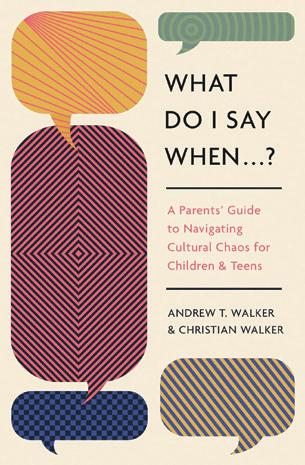
What Do I Say When...?
by Andrew & Christian Walker
A practical guide for parents, offering biblical responses and age-appropriate conversation starters to help children navigate today’s challenging cultural questions with wisdom and conviction.
When the truths of Scripture are woven into the fabric of everyday life, they become a natural lens through which children interpret everything else.
The Role of the Church in Family Discipleship
While parents bear the primary responsibility for discipling their children, the local church is an indispensable partner in this task. A healthy church provides the support, teaching, and community necessary to reinforce what is taught in the home.
Partnering with Biblical Teaching
A strong church will equip parents and children with sound biblical teaching, reinforcing the truths that parents instill at home.
Providing Role Models
In a culture where faithful Christian witness is often rare, children need examples beyond their parents of what it looks like to follow Christ faithfully. The presence of godly mentors— pastors, youth leaders, and mature believers—can help shape a child’s faith in profound ways.
Creating a Culture of Discipleship
Churches must move beyond seeing children’s ministry as entertainment and instead view it as serious discipleship. The goal is to keep kids busy and prepare them for a lifetime of faithful Christian living.
The Importance of Daily Faith Habits
Discipling our children does not require a seminary degree (but that never hurts, either)—it requires consistency.
Consistent Formation
One of the most effective ways to build a biblical worldview is by integrating
faith into daily rhythms. Simple, repeated habits—like family devotions, prayer before meals, Scripture memorization, and discussions around biblical themes—establish patterns that shape how children view the world. When the truths of Scripture are woven into the fabric of everyday life, they become a natural lens through which children interpret everything else.
Redeem the Mundane
Even bedtime conversations can become moments of theological reflection. Asking questions like, “Where did you see God’s goodness today?” or “What do you think God says about that situation?,” helps kids process life through a biblical lens. These small moments build a foundation that can withstand cultural pressures.
Forming a Theologically Grounded Imagination
Letting the Word Shape Our Outlook
In addition to logic and apologetics, children need a Christian imagination—one that is shaped by the stories, metaphors, and beauty found in Scripture. The parables of Jesus, the poetry of the Psalms, and the sweeping narrative of redemption from Genesis to Revelation help form hearts and minds that long for God’s kingdom.
Learning the Way of Wisdom
Christian books, music, and art that reflect beauty, truth, and goodness can train a child’s desires just as much as their intellect. It is not enough for our
children to know right from wrong; they must also learn to love what is good and despise what is evil (Rom 12:9). A theologically grounded imagination gives them a vision of life that is both true and compelling and joyful.
Training for Real-World Engagement
The goal of discipleship is not merely survival in a hostile culture but faithful engagement. Christian children should be equipped not just to resist cultural lies but to offer a better way. This means encouraging them to ask hard questions, think critically, and speak winsomely. We should prepare them not only to say “no” to the world’s distortions but to offer a resounding “yes” to God’s truth.
In time, they will encounter classmates, coworkers, and friends who challenge their convictions. Instead of fearing those moments, we should prepare them to see them as opportunities—to testify to their hope, love boldly, and represent Christ with grace and truth.
The culture may be coming for your kids—but by God’s grace, they can be ready. Not only to stand firm but to shine.
Conclusion
There is no room for complacency. The culture is coming for your kids, and it will shape them if you do not. But Christian parents are not powerless. God has given us everything we need—His Word, His Spirit, and His Church—to raise our children in the truth.
The question is not whether we can disciple our kids but whether we will. The time to prepare is now. Are you ready?
From Strangers to Siblings: the Power of Brothers and Sisters in Christ
by Gregg R. Allison
One of the most remarkable effects of embracing salvation by the grace of God in Jesus Christ is that Christians are incorporated into the church. While we are quite familiar with metaphors for the church—the people of God, the body of Christ, and the temple of the Holy Spirit—there is another metaphor that is more pervasive in the New Testament: the family of God or the siblingship of all Christians. This new family identity is the result of God’s mighty work of adoption by which he “takes sinful people—enemies who are separated from him and strangers to one another—and embraces them as
beloved children who, as brothers and sisters, are united into his family forever.”1
Redemption through the Son of God results in their adoption as sons and daughters, together with the reception of the Spirit of adoption by whom God is called “Abba! Father!” (Rom 8:14-16; Gal 4:4-7). Adoption as children into the family of God means further that Christians are brothers and sisters, united with one another (Gal 3:26-28) and fellow heirs with Christ (Rom 8:17). Viewed within a trinitarian framework, the church as family consists of all Christians who, as sons and as children, have the first person for their Father, the second person as their brother, the third person as witness to and seal of
1. Adapted from Gregg R. Allison, The Baker Compact Dictionary of Theological Terms (Grand Rapids: BakerBooks, 2016), s.v. “adoption.” Some of this discussion is adapted from Gregg R. Allison, Complementarity: Dignity, Difference, and Interdependence (Brentwood, TN: B & H Academic, 2025).
their adoption (Rom 8:16; Eph 1:13), and one another as siblings.2
This article will present the metaphor of the family of God and its biblical basis, link the concept of siblingship to the idea of sociality, and conclude with some implications/applications of siblingship.
The Metaphor of the Family of God
The most prevalent New Testament metaphor of the church is that of family. Biblical phrases “the household of faith” (Gal 6:10) and “the household of God” (Eph 2:19; 1 Pet 4:17) specifically underscore the familial relationships of brothers and sisters in Christ. The constant way of addressing Christians as “brothers and sisters” provides a similar emphasis.3 Romans 8:29-30 offers a hint of this as it details God’s mighty works of salvation to rescue his sinful image bearers:
Those he foreknew he also predestined to be conformed to the image of his Son, so that he would be the firstborn among many brothers and sisters. And those he predestined, he also called; and those he called, he also justified; and those he justified, he also glorified.
These mighty divine works have wonderful blessings for those whom God redeems. To focus on just one benefit, fallen image bearers have been eternally chosen by God to be restored to their proper image bearing. Even more, they will one day be fully
2 The language of “sonship” refers to the covenantal framework that directed the familial blessings and inheritance to go to sons and not daughters. The term sounds sexist in our contemporary society; the new covenant, “sonship,” is not restricted to male disciples but includes both men and women followers of Christ. Sisters and brothers alike receive all the benefits of salvation and are heirs of eternal blessings through the Holy Spirit.
3 The Christian Standard Bible translates the Greek adelphoi as “brothers and sisters” 129 times.
and eternally conformed to the image of Jesus Christ. As great as this benefit is for Christians, it is a means to something still greater: their salvation will result in Jesus being “the firstborn”—the preeminent one— among them. We can imagine that after his return and for all eternity, Jesus will be seated on his throne, surrounded by his eminent image bearers, all of whom will worship their preeminent Savior, who is himself the Image of God.4
Not to be overlooked in this passage is the description of Jesus’s followers: they are “many brothers and sisters.” Siblingship is tied to the mighty works of salvation, the preeminence of the Son, and full conformity of the redeemed to his image. Brothers and sisters will be eternally tied together and united to Jesus Christ.
This theme of siblingship and salvation is echoed elsewhere. As Paul explains, “My brothers and sisters, you also were put to death in relation to the law through the body of Christ so that you may belong to another. You belong to him who was raised from the dead in order that we may bear fruit for God” (Rom 7:4). New belongingness for believers involves not only belonging to the resurrected Jesus but also belonging to one another as brothers and sisters. Similarly, Hebrews links together the perfected incarnate Son, God the Father, and the redeemed (Heb 2:10-13):
In bringing many sons and daughters to glory, it was entirely appropriate that God—for whom and through whom all things exist—should make the pioneer of their salvation perfect through sufferings. For the one who sanctifies [Jesus] and those who are sanctified [believers] all have one Father. That is
4 On the eminent glory of fully redeemed people, C. S. Lewis reminds us “that the dullest and most uninteresting person you can talk to may one day be a creature which, if you say it now, you would be strongly tempted to worship.”
C. S. Lewis, The Weight of Glory (1949; repr., San Francisco: HarperOne, 2001), 45-46.
why Jesus is not ashamed to call them brothers and sisters, saying:
I will proclaim your name to my brothers and sisters; I will sing hymns to you in the congregation.
(Ps 22:22)
Again, I will trust in him. And again, Here I am with the children God gave me. (Isa 8:1-18 LXX)
The fully prepared incarnate Son saves and brings to glory children—sons and daughters—of the Father and incorporates them as his own brothers and sisters into his worshiping church.
To summarize, through their common salvation, Christians are bonded together as brothers and sisters.
Siblingship and Sociality
The metaphor of the family of God and our discussion of siblingship dovetails well with another concept: sociality.
As I define it, “Sociality is the universal human condition of desiring, expressing, and receiving human relationships.”5 It is by divine design that Christians desire to connect with other believers and become close friends to overcome their bent toward isolation and reduce the pain of loneliness.
We express our sociality by joining with others in community in which we expect to experience unconditional love, steadfast care for one another, the sharing of prayers and burdens, and confession of sin that is met by extending forgiveness. We are receptive of other people’s companionship when our suspicion of them yields to trust, when our fears of betrayal and being disappointed by them give way to dependence on them, and when they do indeed fail us, we are shaken but not shocked by the revelation of their sin.6
5. Gregg R. Allison, Embodied: Living as Whole People in a Fractured World (Grand Rapids: BakerBooks, 2021), 75.
6 Allison, Embodied, 76.
Particular manifestations of sociality include small groups at church, neighborhood Bible studies, various clubs, participation on sports teams, and more.
Sociality is promoted by positive factors such as spending time with one another, listening well, asking good questions during conversations, and being honest and vulnerable with one another. Factors that hinder sociality include pride, being self-absorbed when together with others, responding to comments by others with stories about oneself, and inattentiveness.
Sociality comes with both a design and a capacity.7 In terms of the first aspect, according to God’s design, all people desire, express, and receive relationships. Women enjoy pure, non-sexual, lifegiving friendships with other women and men.
Men enjoy pure, non-sexual, life-giving friendships with other men and women. The second aspect is the human capacity to desire, express, and receive relationships in either a positive or negative way. Concerning the positive manner, Christians do indeed engage in relationships in accordance with God’s design (the first aspect). As brothers and sisters, our siblingship is characterized by love, acceptance, forgiveness, honor, deference, and hospitality. Concerning the negative manner, Christians pervert relationships through both unconscious ways (for example, being unaware of or insensitive to the needs of others) and conscious ways (for example, refusing to extend forgiveness and thus ruining a friendship).
For our purposes, sociality intersects with siblingship, prompting brothers and sisters to know, love, honor, and serve one another. Following Scripture as their guide and being filled with the Holy Spirit, Christians are empowered to live holy lives and have pure sibling relationships. As brothers and sisters, they live and champion exemplary, godly friendship
7 Some of this material is adapted from Allison, Embodied, 78-79. My thanks to Gracilynn Hanson for providing the concept of, and language for, design and capacity.
by respecting, esteeming, promoting, and giving preference to one another.
Siblingship and Its Implications/Applications
The implications and applications of siblingship are many and impact various arenas, three of which are presented here.
Siblingship Impacts How the Church Worships
First, collectively as the worshiping assembly, all siblings actively participate: “What then, brothers and sisters? Whenever you come together, each one has a hymn, a teaching, a revelation, a tongue, or an interpretation. Everything is to be done for building up” (1 Cor 14:26).8 As they assemble “in harmony with one another” (Rom 15:5), they worship so as to “glorify the God and Father of our Lord Jesus Christ with one mind and one voice” (Rom 15:6). They properly participate in the Lord’s Supper (1 Cor 11:33), a rite that both vividly portrays and fosters their unity: “because there is one bread, we who are many are one body, since all of us share the one bread” (1 Cor 10:17). As “dear brothers and sisters,” they hear and obey the biblical exhortation to “be steadfast, immovable, always excelling in the Lord’s work” (1 Cor 15:58).
Reciprocally as siblings, they actualize Paul’s directive: “Let the word of Christ dwell richly among you, in all wisdom teaching and admonishing one another through psalms, hymns, and spiritual songs, singing to God with gratitude in your hearts” (Col 3:16). Sisters and brothers employ their (non-gendered) gifts to build up their family members (1 Cor 12-14). They emulate stellar examples of Christlikeness (Phil 3:17), especially the model of their leaders, whom they obey and whose faith they imitate (Heb 13:7, 17).
Siblingship Contributes to the Flourishing of the Church Second, a familial atmosphere characterizes church members in general, as Paul instructs, “Don’t rebuke an older man, but exhort him as a father, younger men as brothers, older women as mothers, and the younger women as sisters with all purity” (1 Tim 5:1–2).
More broadly still, these familial relationships are at the heart of the New Testament’s “one anothers” commands to love one another, accept one another, forgive one another, pray for one another, defer to one another, serve one another, submit to one another, show hospitality to one another, confess sins to one another, and more. As virtuous siblings, they attend to morally excellent and praiseworthy things (Phil 4:8), live in God-honoring ways (1 Thess 4:1), share in a heavenly calling (Heb 3:1), hold on to sound
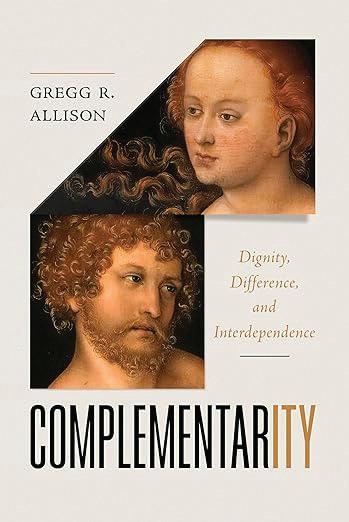
Complementarity by Gregg Allison
A compelling vision of complementarity— grounded in Scripture, theology, and history—that affirms equal dignity, meaningful difference, and mutual flourishing for men and women in every sphere of life.
8 Paul has particular instructions about men and women prophesying, praying, and speaking in tongues (1 Cor 11:4-6; 14:27-40).
doctrine and practice (2 Thess 2:15; 3:16), persist in good works (2 Thess 3:13), are quick to listen, slow to speak, and slow to anger (James 1:19; cf. 3:10; 4:11), and confidently express faith, hope, and love (Heb 10:1925). As they embody these directives, they contribute to the individual and corporate flourishing of their brothers and sisters.
Siblingship Highlights Love as the Center of the Church. Third, the metaphor of the family of God places love at the front and center of the church. As Paul exhorts, “Love one another deeply as brothers and sisters. Take the lead in honoring one another” (Rom 12:10).
In Paul’s honor-shame culture, people of lower status were to honor people of higher status, but not vice versa. By contrast, church members are to show no such stratification: whatever their status may be— higher, equal, or lower—Christians are to take the initiative in honoring one another. Specifically for our purposes, siblings are to seek to outdo one another in honoring their brothers and sisters. Members of the family of God resist male superiority/female inferiority and vice-versa. There should be no demeaning or denigrating of one another due to race, ethnicity, educational level, and/or socio-economic standing. Honor replaces humiliation. And sibling love, which should always be on the increase (2 Thess 1:3), knows no bounds, with sisters and brothers sacrificing themselves for one another: “This is how we have come to know love: He [Jesus] laid down his life for us. We should also lay down our lives for our brothers and sisters” (1 John 3:16).
Conclusion
This article has discussed the most prevalent metaphor for the church—the family of God—by explaining its biblical basis, linking the concept of siblingship to the idea of sociality, and offering several implications/applications of siblingship for members—brothers and sisters—of the church.
Choose a Doctoral Progam Designed to Strengthen You and Your Church.
THE HIGHEST LEVEL OF SCHOLARSHIP FROM A FACULTY WITH UNMATCHED MINISTRY EXPERIENCE.

Explore your options and find the perfect fit for your ministry with our DOCTORAL DEGREE FINDER TOOL
Puritan SpirituallyFocused Parenting
by Shawn D. Wright
The English and American Puritans of the seventeenth and eighteenth centuries looked like most parents before and after them. They labored to train their children to obey them, to be respectful toward others, and generally to be responsible as they matured into adulthood. They sought to educate their children so that they might honor the Lord with their minds and thinking, especially that they might be able to read the Bible for themselves. They strived to help their sons learn trades and enter into meaningful vocations, enabling them to support their families. Their daughters they trained to be productive and caring wives and mothers.1
In other ways, though, the Puritans stressed some aspects of parenting with unusual vigor. We have much to learn from them in three areas: parents’ obligation to do spiritual good to their children, their catechizing of their children, and their aggressive preaching of the gospel to their children.
In the first place, God gave parents a unique responsibility to do spiritual good to their children. John Geree’s remarks about fathers in his 1646 tract, The Character of an Old English Puritan, or Nonconformist, allow us to hear directly from a Puritan about the spiritual responsibilities a father had towards the salvation of his children.
His family he endeavors to make a church, both in regard of persons and exercises, admitting none into it but such as feared God; and laboring that those that were borne in it, might be born again unto God.
1. See especially Edmund S. Morgan, The Puritan Family: Religion and Domestic Relations in Seventeenth-Century New England (New York: Harper and Row, 1966); and Leland Ryken, Worldly Saints: The Puritans as They Really Were (Grand Rapids: Zondervan, 1986), especially chapter 5, “Family.”
He blessed his family morning and evening by the word and prayer and took care to perform those ordinances in the best season. He brought up his children in the nurture and admonition of the Lord.2
2 Gordon S. Wakefield, Puritan Devotion: Its Place in the Development of Christian Piety (London: Epworth, 1957), x.
Geree viewed the parents, children, and servants as members of the family. Fathers were to hire servants who were godly and to strive for the conversion of their children. The ultimate goal of the Puritan parent was that his or her children “might be born again unto God.” Similarly, John Cotton exhorted, “If God make a Covenant, to be a God to thee and thine, then it is thy part to see it, that thy children and servants be Gods people.”3 Another Puritan, William Gouge, noted the critical role that parents played in their children’s lives. “In the family,” he declared, “a parent is all in all over his child: a king, a priest, and a prophet. Therefore that which a minister is to do for the instruction of the church, a parent must do at home.”4
Thomas Watson urged parents and children to understand the authoritative positions that parents occupied in their children’s lives, especially for the children’s spiritual good. He urged that “Parents are, as it were, in the room of God; if they would teach you the fear of the Lord, you must listen to their words as oracles, and not be as the deaf adder to stop your ears.”5 Moreover, he called on parents diligently to strive for their children’s spiritual well-being. Strikingly, he declared, “You conveyed the plague of sin to them, therefore endeavour to get them healed and sanctified.”6
In the second place, parents were to catechize or teach their children the contents of the Christian faith. As biblical Calvinists, the Puritans knew that God used means to bring his elect to salvation. The Holy Spirit worked through the proclamation of the gospel to bring sinners to salvation. Thus, the contents of the
3. Morgan, The Puritan Family, 7.
4. William Gouge, A Holy Vision for Raising Children, vol. 3, Building a Godly Home (Grand Rapids: Reformation Heritage Books, 2014), 120.
5. Thomas Watson, The Ten Commandments (1692; repr., Edinburgh: Banner of Truth, 1959), 129.
6 Watson, The Ten Commandments, 134.
gospel had to be taught, and the claims of the gospel had to be pressed upon sinners. The Puritans did this with their children by catechizing them in Christian doctrine and imploring them to trust in Jesus for their salvation.
The gospel was the power of God for salvation (Rom 1:16). It had to be understood and believed for one to attain salvation (e.g., John 3:16–18). For this reason, God began his work of salvation in a person through their understanding. As Cotton Mather proclaimed, “Every Grace enters into the Soul through the Understanding.”7 Parents, therefore, must teach their children to read, especially so that they can read and understand God’s Word for themselves. After all, “there is a secret power hidden in the Holy Scriptures (which are God’s own Word) more than in any books of men, so as through God’s blessing there may by this means be an inward work of grace in children even in their young years.”8
Catechism writing flourished in the Puritan movement.9 Surely, the best-loved of them was the Westminster Shorter Catechism, produced by the Puritan Westminster Assembly in 1647. The Shorter Catechism served as a tool to teach children essential Christian doctrine. Its accompanying Larger Catechism of the same year intended to guide pastors and parents in the faith, allowing them to understand doctrine more comprehensively so that they might explain it to their children who were learning the Shorter Catechism. The fuller Westminster Confession of Faith (1647) stood as the pinnacle of the faith for parents to learn in order to instruct their children. Richard Baxter, for example, exhorted fathers to study these documents for the sake of their children’s
7 Morgan, The Puritan Family, 89.
8 Gouge, A Holy Vision for Raising Children, 122.
9 J. Lewis Wilson, “Catechisms and the Puritans,” in Puritan Papers: Volume Four, 1965–1967, ed. J. I. Packer (Phillipsburg, NJ: P & R, 2004), 137–54.
spiritual good: “I do therefore desire, that all masters of families would first study well this work themselves, and then teach it their children and servants, according to their several capacities. . . . First, let them read and learn the Shorter Catechism, and then the Larger, and lastly, read the Confession of Faith.”10 The responsibility did not rest on the fathers alone. Gouge, for example, stressed that “Parents ought to begin to nurture their children as soon as they are capable of any instruction.” Then he noted, “Let mothers especially note this point of timely nurture as particularly pertaining to them,” citing several biblical texts to this effect.11 Because mothers spent more time than fathers with children, mothers must start instructing early.
Children are sinners who must trust Christ for salvation if they are going to go to heaven. Gouge proclaimed that “children [must] be taught piety because they are not born but made Christians. By nature they are utterly destitute of all piety.” He went on to note, “If therefore their children live and die in ungodliness through their parents’ negligence, their blood shall be required at their parents’ hands.”12
In Puritan New England, laws were enacted requiring at least weekly catechism instruction in the home.13 Wisdom, though, was to be exercised so as not to overload young minds with more than they could take in. “In giving this spiritual food,” Gouge opined, “parents deal with their children as skillful nurses and as mothers do in feeding infants. They will not at once cram more into their mouths than their stomach is able to digest, but they will rather often feed them
10 J. I. Packer, A Quest for Godliness: The Puritan Vision of the Christian Life (Wheaton, IL: Crossway, 1990), 271.
11. Gouge, A Holy Vision for Raising Children, 127, 130. He referenced Proverbs 1:8; 6:20; 31:1; 2 Timothy 1:5; 3:15.
12 Gouge, A Holy Vision for Raising Children, 119.
13 Morgan, The Puritan Family, 98.
with a little.”14 Additionally, parents were urged not just to require perfect recitation of the catechism answers (which they were) but also to discuss the content with their children so that they might come to understand its significance.15
English Calvinistic Baptists were heirs of the Puritan tradition. Benjamin Keach, for instance, “baptized” the Westminster Shorter Catechism. The resulting Baptist Catechism, or “Keach’s Catechism,” was a mainstay of Baptist life for centuries in both England and America.16 It was used for the instruction and conversion of many a child over the years. For instance, one young lady recounted its usefulness in her life in the nineteenth century:
At our quarterly sessions, we children of the congregation repeated The Baptist Catechism standing, in a circle round the font. We numbered from sixty to a hundred. . . . We had to memorize the whole book, for none knew which question would fall to them. . . . The practice was of incalculable benefit, for when it pleased God to change our hearts, and when offering ourselves to the church for membership, we knew what the church doctrines meant and were quite familiar with answering questions before the whole congregation, and did not quake when pastor or deacon or anyone else asked what we understood by Baptism, the Lord’s Supper, Justification, Adoption, Sanctification. Oh, no; we had been well taught. . . . What a pity that such a course of instruction has been abandoned.17
What a pity indeed.
14. Gouge, A Holy Vision for Raising Children, 123.
15. Morgan, The Puritan Family, 98–99.
16 See Tom J. Nettles, Teaching Truth, Training Hearts: The Study of Catechisms in Baptist Life, Calvary Press Baptist Heritage Series (Amityville, NY: Calvary Press, 1998), 19, 47–78.
17 Nettles, Teaching Truth, Training Hearts, 21–22.
In the third place, Puritan parents and pastors pressed the claims of Christ on their children. They knew children did not just grow into Christians. Rather, God had to sovereignly convert them, and he did so via the means of gospel proclamation. Puritans called on their children to repent and trust in Christ, lest on the final day, they would be condemned to hell. Advantages came to their children since they were born into Christian families—they grew up around godly parents, went to church, were taught their catechisms, read their Bibles, and more. But all these would result in just so much more condemnation if the children did not trust in Jesus after having been given so many advantages by him. For example, before his death, Cotton Mather charged his daughter that a book he had written on children’s salvation would “bee a terrible Witness against my own Children, if any of them should not bee Godly.”18
Puritan sermons included regular evangelistic applications for children. Sermons with titles such as “What Means May Be Used Towards the Conversion of our Carnal Relations?” (delivered by Samuel Lee) and “What May Gracious Parents Best Do for the Conversion of Those Children Whose Wickedness is Occasioned By Their Sinful Severity or Indulgence?” (preached by Thomas Lye) did just that. Daniel Burgess’s “Wherein may we more Hopefully attempt the Conversion of Younger People, than of Others?” did the same. He offered three reasons why children should repent:
Reason 1. You are commanded, as truly as the oldest people living, to turn to God presently—Therefore it is your duty. . . . He calls you, the youngest of you; and as expressly and frequently, and more frequently, than he calls old people.
Reason 2. You are threatened just as old people be, if you turn not unto God presently—Therefore it is
18 Morgan, The Puritan Family, 138.
your duty. . . . neither are you less under the menaces and threats of the Lawgiver than other folk be.
Reason 3. You have the promises of as good things as the oldest people have, if you do convert presently— Therefore it is your duty. . . . Consider ye here, God promises you spiritual, temporal, and eternal blessings; and the very same that he promises to converts of the fullest age.19
Jonathan Edwards’s sermons—such as “Children Ought to Love the Lord Jesus Christ Above All”20 pulse with evangelistic applications to children. He concluded his famous “Sinners in the Hands of an Angry God” with this poignant address to children:
And you children that are unconverted, don’t you know that you are going down to hell, to bear the dreadful wrath of God that is now angry with you every day, and every night? Will you be content to be the children of the devil, when so many other children in the land are converted, and are become the holy and happy children of the King of King.21
Once again, later Baptists benefited from the evangelism of the earlier Puritan tradition, specifically such lengthy evangelistic tracts as Baxter’s A Call to the Unconverted (1658) and Joseph Alleine’s An Alarm to the Unconverted (1671). The nineteenth-
19 Daniel Burgess, “Wherein May We More Hopefully Attempt the Conversion of Younger People, than of Others?” in Puritan Sermons: 1659–1689, vol. 4, trans. James Nichols (Wheaton, IL: Richard Owen Roberts, 1981), 553–56.
20 Jonathan Edwards, Sermons and Discourses, 1739–1742, vol. 22, The Works of Jonathan Edwards, ed. Harry S. Stout, Nathan O. Hatch, and Kyle P. Farley (New Haven, CT: Yale University Press, 2003), 171–81. The sermon can also be found online at edwards.yale.edu.
21 Jonathan Edwards, “Sinners in the Hands of an Angry God,” in A Jonathan Edwards Reader, ed. John E. Smith, Harry S. Stout, and Kenneth P. Minkema (New Haven, CT: Yale University Press, 1995), 104–5.
century Baptist pastor Charles Spurgeon lauded their influence on him in his childhood due to his mother’s diligent evangelism:
I cannot tell how much I owe to the solemn words of my good mother. It was the custom on Sunday evenings, while we were yet little children, for her to stay at home with us, and then we sat round the table, and read verse by verse and she explained the Scripture to us. . . . After that was done, then came the time of pleading; there was a little piece of Alleine’s Alarm, or of Baxter’s Call to the Unconverted, and this was read with pointed observations made to each of us as we sat round the table; and the question was asked, how long before we would seek the Lord. Then came a mother’s prayer, and some of the words of that prayer we shall never forget, even when our hair is grey. I remember on one occasion, her praying thus: “Now, Lord, if my children go on in their sins, it will not be from ignorance that they perish, and my soul must bear a swift witness against them at the day of judgment if they lay not hold of Christ.” That thought of a mother’s bearing swift witness against me, pierced my conscience, and stirred my heart.22
May we have the same evangelistic zeal as Eliza Spurgeon (and Jonathan Edwards, Daniel Burgess, and so many others) as we call our children to put their trust in Jesus Christ for their salvation. Learning from our Puritan heritage, let us take our responsibility as parents seriously.
22 Charles H. Spurgeon, Autobiography: Volume 1, The Early Years, 1834–1859, rev. ed. (Edinburgh: Banner of Truth, 1962), 43–44.
“Puritan parents and pastors pressed the claims of Christ on their children. They knew children did not just grow into Christians. Rather, God had to sovereignly convert them, and he did so via the means of gospel proclamation.”
Recovering Preaching That Builds the Home
by Hershael W. York
Now, in my fifth decade of ministry, I confess that nothing is more satisfying than seeing a family that stayed intact after a serious moral breach of some kind because the Word of God shaped and molded them back together. The delight I feel when, on occasion, I run into a couple that once was on the verge of breaking up but today are still together by God’s grace manifest through His Word and serving the Lord, still deeply in love and even enjoying grandchildren, is unlike any other joy.
Years ago, a pastor called me in bewilderment about a situation. He related that a couple on staff at his church had a serious breach of trust because of a sin in one of their lives. They desperately needed counsel and direction, but because of collateral damage, it was impossible for them to remain members of his church while they worked through it. “Will you take them?,” he asked. “Will you walk with them through their repentance
and restoration?” A family, especially one with three young children, was worth fighting for, so I agreed. I explained that all I had to offer was a firm commitment to the gospel, but if they were willing to uproot and move to our community, come under the authority of our church, sit under the preaching of the Word, and meet with me and my wife regularly, we would take them and trust God to work.
It would be difficult to describe the challenge we all faced when they came, but in the ensuing weeks, months, and years of them sitting under the preaching and receiving counsel and encouragement to walk the long, hard road of repentance, the Word of God began to change their lives. When either of them grew tired and was ready to give up, something in a sermon would remind them that as long and difficult as the road of genuine repentance might be, it would prove the only road with a destination worth having.
That occurred nearly twenty years ago. Recently, I received a text from the wife: “I just got off the phone with a woman who is in crisis with her husband, and my advice, every time, is a repeat of your words to me.” My wife, Tanya, and I met with them many times and said hard things that needed to be spoken (and
obviously remembered), but mostly, they simply sat under the preaching of the Word, letting the Holy Spirit alternately wound and heal their hearts. Today, that couple, once on the brink of separation and divorce, remain blissfully together. Their children grew up in a home where both parents walked the road of repentance, and they saw it lead to a place of godly transformation and delight. What a grace that they enjoy their grandchildren together because the Word of God had such a powerful effect and radically changed their trajectory. Nothing could be more satisfying than knowing that the Word of God I preached and taught has a lasting effect on lives and generations.
In every generation, Satan uses new lines of attack to further his old goals. Ultimately, Satan wants to dethrone God, but to do that, he must debase man and destroy the family. His strategy to destroy the family is to deny God’s design in creation and in a natural moral order.
Since the Garden of Eden, Satan has been following this plan, but each generation of preachers must wisely identify the current methods Satan uses and the truths most under attack in order to defend them relentlessly and authoritatively with the Word of God. As the levees of moral boundaries break, even churches and the people of God can be swept away in the rising tide of filth running through the streets of our nation and world. Preachers must be prepared to preach like Noah that
God has prepared an ark of safety by which they can be saved from the flood of judgment.
To protect our families and recover the truth of God’s design for the home, a pastor must commit to five things in his preaching ministry.
Biblical Conviction
Every preacher must give up any pretension that he can find a way to make the biblical truth he preaches palatable or acceptable to the surrounding culture. A man of God needs to count the cost of faithful preaching but evaluate it against the far greater cost of remaining silent. Satan is attacking at the very core truths that even pagans have never questioned. Every culture in the history of the world has been in total agreement that when a healthy baby is born, it will either be a boy or a girl. No one has been confused about that. Ever. Yet our culture is willing to repudiate every culture that came before and say, “But we know better!” No scientific discovery led to this assertion. Who discovered that gender is fluid? Where was the laboratory in which this significant thing was discovered? What was the methodology used, and how can the results be tested and verified?
This generation needs preachers who believe that the Word of God answers and refutes all the wisdom of the world and that the Word of God stands correct though every man be a liar. If the Bible says, “In the beginning, He created them male and female,” then
This generation needs preachers who believe that the Word of God answers and refutes all the wisdom of the world and that the Word of God stands correct though every man be a liar.
all the social engineers in the world saying otherwise are wrong. If the Bible says that marriage is comprised of a man who leaves his father and mother and clings to his wife and that they are one flesh in that marriage for all of their natural life, then no Supreme Court decision to the contrary will change that. A shepherd of God’s people must possess a deep, unshakable belief that God’s Word is sufficient and authoritative for every aspect of life.
Pastoral Sensitivity
A pastor assiduously angered by the persistent pack of mendacities and misrepresentations that Satan hurls might be understandable, but he probably will not be effective. Pastors must learn to preach hard truths with an easy demeanor. They must have a backbone of steel but soft answers and a gentle spirit. The people who scream at us, revile us, attack, and accuse us are not the real enemy. They are the victims of our enemy. They are in bondage and in desperate need of the love of Christ and His saving gospel. They do not need another finger wagged in their face but an open pair of arms ready to receive them and help them find repentance.
Once, a young man I pastored posted on social media that he was gay. I had baptized this young man, and I cared for him very much, so I invited him to my home. I began the conversation with how much I loved him and how Jesus loved him even more, and assured him that I was willing to walk with him on the hard road of repentance. He stopped me abruptly, though not unkindly. “I know what you believe and what our church believes. You’ve always been clear, and I appreciate that you have always been kind, as well. I will always consider you a friend, but I no longer consider myself a Christian. Please remove me from the church roll.” We both were terribly sad, but it meant so much to me that he knew I was acting out of love for him. I did not hate him. I was not repulsed by him. As he left, I wrote my cell number on a card and
had him put it in his wallet. “If you ever are hurting, if you ever are wounded or sad, or just need a friend, I am your guy,” I told him. He is still in a sinful lifestyle, but when we see each other, I always feel his affection and he feels mine. The final chapter is not written yet. I am praying for him as Jesus taught us in Luke 11:5–8 in the Parable of the Friend at Midnight. We need to preach and keep preaching, pray and keep praying, always with compassion for broken families, single parents, those struggling with addictions, and those whose lives have been destroyed by their own sinful or selfish decisions.
Courageous Clarity
I once knew a pastor who could preach on some cultural issue, and when he finished, no one in the church knew where he stood. He was notoriously vague, and when someone in the church came to ask him for a more definitive answer, he would put his arm around their shoulder and say, “Well, tell me what you think.” They would leave and still not know what they came to learn.
On the other hand, some preachers spend all their time defining their views on everything, even things that are not truly moral issues. They love sharing their opinions on current events or politics that have little to do with the core values of the gospel.
The man of God must be clear on those places of attack where Satan is aiming his arsenal. He must exhibit a willingness to name sin, define marriage, speak frankly and biblically about sexuality and gender, and call believers to obedience and all people to repentance and faith. If he fears God, he will not fear man, but if he fears man, he does not fear God. The man of God must fear God and God alone.
Gospel Centrality
Preaching that highlights the law and invites people to obedience is as dangerous as atheism because the law cannot save, and obedience is both impossible and
also unable to save. Gospel preaching invites people to faith in the only One who has kept God’s law perfectly and suffered God’s judgment completely on behalf of anyone who would repent of their sins and believe in Him. Preaching that builds the home is certainly clear on what is right and wrong, but it must unfailingly and clearly be rooted in the gospel of Jesus Christ. Only the gospel can free people from sin. Only the gospel can save them from the postlapsarian noetic effects that cloud their minds so significantly that they can believe something so obviously untrue. The gospel liberates people from their sin, gives them a desire for holiness, equips them with the indwelling power of the Holy Spirit, and enables them as regenerate men and women to obey God’s gracious commands.
Unashamed Frequency
Preachers are sometimes ashamed to be repetitious, but Satan never is. He uses redundancy and frequency to make people believe lies. “Love is love.” “My body, my choice.” “Birthing persons.” “Gender fluidity.” “You’re causing people to commit suicide.” Should a preacher of the gospel of Jesus Christ be afraid to relentlessly speak the truth? Should he believe that variety and entertainment are the antidote to the constant barrage of Satan’s lies?
Every home is built on repetition and redundancy. Meals, washing clothes, going to work, getting the kids to school, and making house payments are ceaseless in their demands. The demand for gospel truth is no less relentless and incessant. A vigilant preacher is a predictable preacher. Everyone in his church knows for certain that, when they gather, they will hear from the Word of God, that the Word will be applied, that they will hear the demands of the text but also the grace of God that will enable them to obey it—every single time they go to church.
Satan is powerful, persistent, and poisonous in his assault on our homes. He is smarter than us, stronger than us, more effective than us. But he is
not a match for Jesus and His Word, and Jesus has promised that the gates of hell cannot hold against the empowered church. As tough as things are, we need not fear. We need only to preach the person and the truth of Jesus Christ as the one who builds His church and our homes.
Pastor Well by Hershael York
A guide for pastors, this book combines biblical conviction with real-world wisdom to help leaders navigate the complexities of ministry with faithfulness, clarity, and confidence.
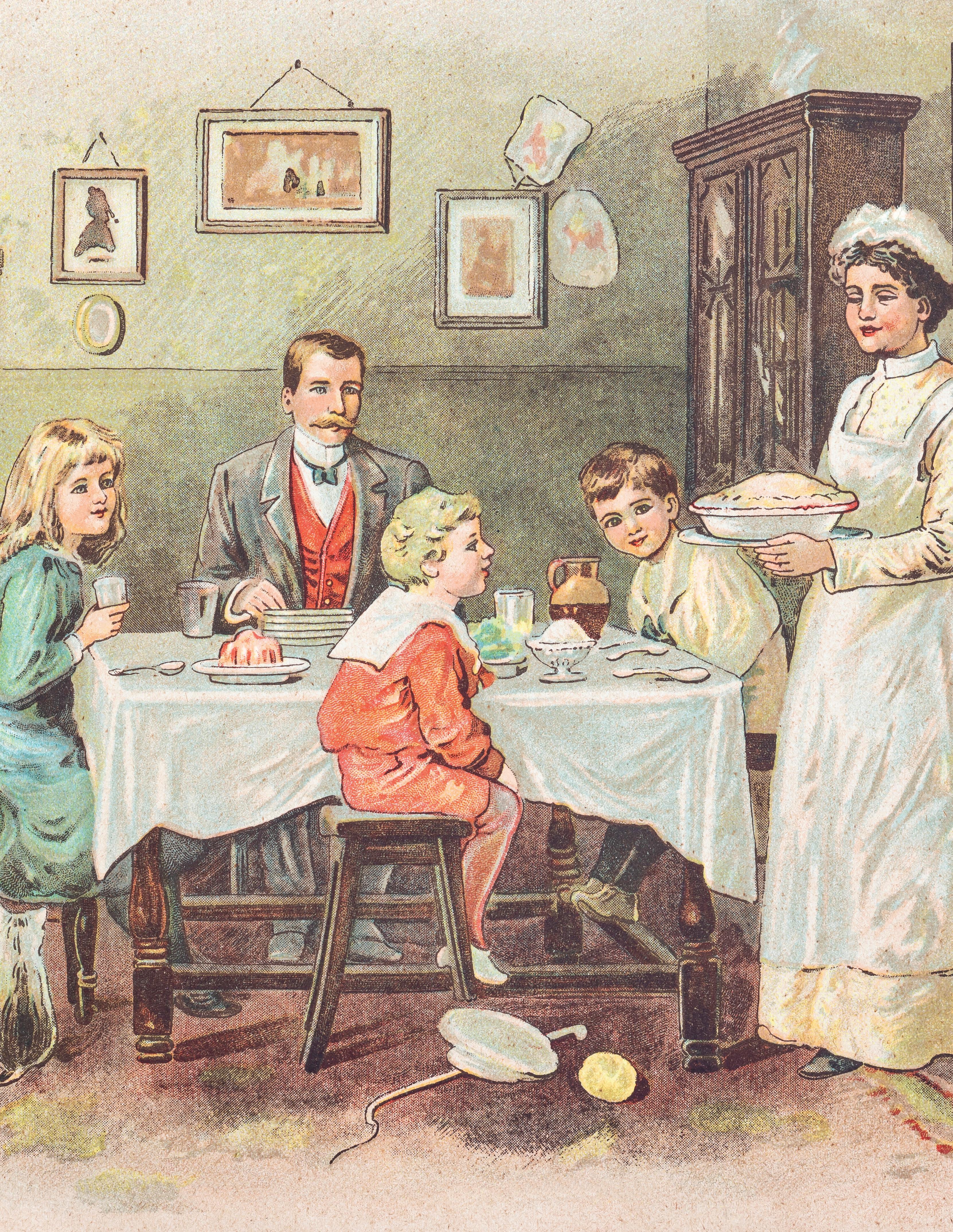
The Gospel at Your Dinner Table: Hospitality as Mission
by John Klaassen
Every year in my Introduction to Christian Missions class, we discuss what it means to be created in the image of God. The imago Dei is fundamental to mission and missions. God is bringing people to Himself; He is a missionary God and calls us to be on mission with Him. To be called on mission is to realize He created us in His image; we are unique in all of creation. One aspect that my students always bring up is that God created us to be social; He created us to be in fellowship with one another. This aspect is further developed in Genesis 2, where God reveals that man was created first. Genesis 2:18 tells us God saw that it was not good for man to be alone and created a helper for him. However, before a helper is made for him, the text tells us that God brought before Adam every animal in the kingdom, and Adam gave them a name, but no suitable helper was found
for him (2:20). God put Adam to sleep and created the first woman. Adam rejoiced in the work of God, as one is created to complete him and be a helpmate to him. God gave Adam someone who was like him with whom he could have fellowship. We learn from the text that God did not create us to live in isolation. He told us to multiply and fill the earth, indicating that as we filled the earth, we would find community with one another. Martin Luther King Jr. once wrote, “At the heart of all that civilization has meant and developed is ‘community’—the mutually cooperative and voluntary venture of man to assume a semblance of responsibility for his brother.”1 Community is cooperative, voluntary, and carries responsibility as we care for one another and serve one another. When Jesus summarizes the Ten Commandments in Matthew 22, He reminds us that we are to love God with all our heart, mind, and soul and our neighbor as
1 James Melvin Washington Jr., ed., A Testament of Hope: The Essential Writings and Speeches of Martin Luther King, Jr. (San Francisco: HarperSanFrancisco, 2003), 122.
Hospitality is about making people feel important and a part of our lives.
ourselves, thus leading to community and fellowship with one another.
As a communal people, we understand that “fellowship” is a Christian mark by which churches measure themselves. The more I travel, the more I realize that we often overlook what it truly means to have fellowship. When I am around internationals, I realize that my Baptist understanding of fellowship—a potluck after church where we eat and go home—is a misunderstanding of genuine fellowship over a meal. My individualistic cultural tendencies drive me from the fellowship God created for me. So, how should we think about fellowship? How should we approach hospitality, particularly in light of the gospel’s presence in the world?
There is an old Arab proverb that states, “Arabs like to feel your presence.” I often think about that in our world. I know that, at times, I am not as good a friend as I should be to my Arab friends because I do not spend the time with them that they might want. Feeling your presence differs from the American adage of “quality time.” It is the quantity that can make a difference. When Job went through all his troubles, his friends came and sat with him. Job 2:13 states that they came and sat with him for seven days before speaking. They were allowing Job to “feel” their presence, to let him know that they were with him. Time with people makes a difference. People need to know we are there for them and care
about them. One of the ways we do that is to let them feel our presence.
Hospitality is about making people feel important and a part of our lives. Interestingly, the concept of showing hospitality is a fundamental principle in Scripture. Peter writes in 1 Peter 4:9, “Show hospitality to one another without grumbling.” It would appear that showing hospitality can be a burden, “grumbling,” but it is a command as we learn to love one another! Interestingly, it is never listed as a spiritual gift. Instead, it is expected as a brother or sister in Christ. Romans 12:13 instructs us to contribute to the needs of the saints and seek ways to show hospitality. While this text instructs us to do this amongst brothers and sisters in the faith, Hebrews insists that we also show hospitality to strangers (Heb 13:2). The author makes reference to Abraham’s experience in Genesis 18 when he meets the angels who will destroy Sodom and Gomorrah. We are to show hospitality without partiality because we never know how God will work in people’s lives.
Let’s examine Genesis 18 and see if we can derive some practical suggestions for practicing hospitality in the American context. Genesis 18:1 tells us that Abraham was sitting by the entrance to his tent in the heat of the day. Like the famous Latin American siesta, people in the Middle East also practiced a form of “downtime” during the middle of the day. It was too hot to work, so people relaxed and let the day come to them. We see Abraham
sitting, waiting to see what would occur that day. He was not being lazy; he was waiting, resting, looking. One of the things I have been learning lately is that, due to the devices we carry, we seldom allow ourselves this “downtime.” We don’t let ourselves get bored; we no longer look for opportunities to do something different or minister to those in need. When we have 15 minutes free, we get on the phone and mindlessly scroll instead of sitting quietly to see what comes to us. We may very well miss opportunities to practice hospitality because we do not see the people in front of us. American hospitality can be as simple as sharing a cup of coffee with someone or as elaborate as preparing a meal, as Abraham does in our story. The question is, are we looking for those people God is putting in front of us as Abraham was?
The second thing we see is that Abraham was proactive as he met the men approaching him. In typical Middle Eastern custom, he greeted them and invited them to sit, to be with him. He did not know them but saw an opportunity and invited them into his life. This attitude of hospitality is what I miss most about North Africa. Do we take the time to be with people and invite them to be a part of our lives? Whether it is lingering over a cup of coffee or a meal, this aspect of being with them speaks volumes. People need to “feel” our presence; they need to know we are there for them and we will be there for them.
Third, Abraham insisted that they stay with him and eat a full meal. In verse 4, he invited them to wash their feet and rest under a tree. He tells them he will bring them some bread to find strength, but then he tells Sarah to make bread from scratch. He finds a tender calf, butchers it, and prepares it for them. This meal is neither quick nor simple. It shows abundance and care in the time it took to prepare. So many times when we lived in North Africa, after a day’s work in development digging trenches for pipes to bring clean water or working on bathhouses and latrines, we would be invited to someone’s home to have dinner.
When we arrived, they would find the chicken or turkey to be butchered and start cooking the meal. Hours would pass as we waited for the food to be prepared, sitting, fellowshipping, and sharing life with our friends. We may not be able to prepare full meals for our new friends, but the idea is that we sit together, share fellowship, and take the time to get to know each other. It was amazing how, with a little intentionality, we can quickly turn to gospel conversations as we sit together, enjoying one another’s company and learning about one another’s world.
Fourth and last in our story is Abraham’s position. This position of standing and taking care of his invited guests was challenging to get used to in North Africa. The owner of the house would often stand by the door as Abraham did. His goal was to make sure we were well taken care of. He would bring more food as needed, pick up plates, and serve much like a waiter in a restaurant. We would invite him to sit with us, to eat with us, but most often, he would stand by the door and coordinate everything for us. His honor was found in serving us well. While American hospitality may not resemble this, and it might make most of us uncomfortable, I think the idea remains valid. Abraham wanted to ensure his guests knew they were important to him. In his world, it was by serving them. In our world, it is by demonstrating that people have dignity. John Perkins has often been quoted as saying, “You don’t give people dignity. You affirm it.” Abraham was affirming the dignity of his guests by serving them according to the customs of his day. We do the same as we serve those who are around us according to our customs and traditions—being quick to pay for the coffee or the meal, inviting people into our homes while respecting their time, or finding other ways to spend time with them doing things that interest them. Showing genuine interest in them as people, created in the image of God, worthy of our time and hospitality.
There is another interesting biblical story that might help illustrate this point of showing hospitality. Jesus was invited to the home of Simon, a Pharisee’s home, to eat. While He was there, a woman with a bad reputation came in and she began to lavishly care for Jesus as He sat in this home. The story tells us that Simon was angered by Jesus, arguing that if Jesus was who He said He was, He would not allow her to touch Him as she was surely unclean. Jesus, using a parable, asks the Pharisee who would love more, one who has been forgiven little or one who has been forgiven much. Obviously, Simon answered the one who has been forgiven much. The story then takes an interesting turn as Jesus points to Simon’s lack of hospitality. He points to three things: he wasn’t offered water for his feet, he was not properly greeted with a kiss, and his head was not anointed with oil. When we read the story, we often say, as Simon did, that this woman was the one who had been forgiven much. I wonder if that is what Jesus was saying. Could it be that Simon’s remarkable lack of respect and hospitality was what was most dishonorable? He had, in fact, insulted Jesus by not offering water for his feet, a kiss of greeting, or oil for his head, which would have been considered great sins in his time. At least the woman sought forgiveness and grace, repenting as she went about showing honor to the one who deserves all honor. Showing hospitality is going out of our way to demonstrate love, giving honor to the person we are sharing with, and showing honor and respect. When someone feels honored and respected, they will listen with more open ears to what we want to share. Hospitality can open doors wide to the gospel.
Hospitality as missions may very well cost us something! It will cost us time, energy, and money. However, showing dignity to those around us and giving hospitality to our neighbors says something beautiful and opens hearts to the gospel. God created us in His image so that we could know and love Him, and so we could love our neighbor as ourselves. Hospitality demonstrates love for neighbor as nothing else can. Demonstrating our love for others should reflect our love for God!
“Hospitality as missions may very well cost us something! It will cost us time, energy, and money. However, showing dignity to those around us and giving hospitality to our neighbors says something beautiful and opens hearts to the gospel.”
BY J OHN K LAASSEN
Click with Caution: How Technology is Discipling Kids
by Jason Thacker
It all seems to start with an innocent scroll or swipe. And before we know it, we look up and wonder where the time has gone. Or maybe for you and your kids, it seems that the more we are online, the more anxious, stressed, isolated, or frustrated we become. For all of the benefits and conveniences, technology seems to be doing something to us, and the effects do not seem to align with all of the lofty initial promises made by their designers.
We were told we would have a more open, free, and better society, but basic civil liberties are being suppressed in the emerging digital public square and cultural values antithetical to biblical truths are becoming more and more normalized in our lives. We were told we would enjoy access to more information than the world had ever seen before and how this would usher in a more united society, but it seems that we are more overwhelmed by mistruths and divided than ever. We were told that these tools would
simply be tools that we would use to make our lives better, but if we are honest, at times, it seems that they are actually using us.
No matter where we turn these days, technology is ubiquitous, and convenience is king. Even when we want to resist certain advances, it is hard to live in today’s world without them. From morning to night, we are surrounded by devices and digital tools—adults and kids alike. And whether we admit it or not, we are constantly being discipled by something or someone. Technology is more than just a tool as it is radically yet subtly shaping everything about our lives and the world around us.
Too often, we either uncritically embrace or completely reject new technologies. Some rush forward to avoid being left behind, while others resist, longing for some semblance of a simpler past. As parents, we feel this tension daily. Our son asks for a video game console to play with friends, but soon, we notice subtle shifts in his behavior and desires. Our daughter wants a phone and access to social media
because everyone else has them. We hesitate, wanting her to belong, but we worry about what those screens might shape in her. These decisions are never simple. We see the potential good, but we also see what is lost. So, what do we do? Embrace it all and hope for the best, or retreat into a nostalgia that is not coming back?
Raising children in a digital age requires more than simply choosing to embrace or reject new technology. The Christian ethic calls us to a wise, virtuous approach of critically engaging these realities, recognizing how these tools are shaping and discipling all of us—including our kids. Technology is not neutral. It forms how we see God, ourselves, and our neighbors. But in the face of these challenges, Scripture remains good and sufficient. By taking a holistic view of technology as more than simply a tool, we not only understand what technology is and what it does to us, but we can also begin forming counternarratives—stories that give our children a truer vision of God, humanity, reality, truth, and faithful living.
What is Technology?
While it would be nice to have a quick fix—five rules or a new app to solve our technology struggles—it is not that simple. Bad habits do not form overnight, and godly habits do not either. To parent wisely in a digital age, we have to slow down and recognize that technology is not just something we use; it is shaping us and shaping
everything about how we understand the world around us. Technology has such a formative influence on us, but we often miss what is taking place as it is subtle and seemingly inconsequential at the moment.
Most of us are familiar with the old adage, “When you have a hammer, everything looks like a nail.” This saying becomes clear when a young child picks up a toy hammer. With a hammer in our hand, we all instantly know that it is designed to hit things— whether those things are actual nails or not. This is because all tools have a particular purpose and design. As media theorist Neil Postman wrote, “To a person with a pencil, everything looks like a sentence. To a person with a TV camera, everything looks like an image. To a person with a computer, everything looks like data.”1
Theologian and ethicist Jacob Shatzer adds here that “when you’ve got a smartphone with a camera and the ability to post something online, everything looks like a status update.”2 Postman argues that those truisms call to our attention that every technology has a prejudice, purpose, or design both with intended and unintended consequences. He explains that “embedded in every tool is an
1 Neil Postman, “Five Things We Need to Know about Technological Change” (talk given in Denver, Colorado, March 28, 1998).
2 Jacob Shatzer, Transhumanism and the Image of God: Today’s Technology and the Future of Christian Discipleship (Downers Grove, IL: IVP Academic, 2019), 7.
To parent wisely in a digital age, we have to slow down and recognize that technology is not just something we use; it is shaping us and shaping everything about how we understand the world around us.
ideological bias, a predisposition to construct the world as one thing rather than another, to value one thing over another, to amplify one sense or skill or attitude more loudly than another.”3 These tools shape not only what we think about but how we think—and even what kind of community we value.
We often miss how deeply these tools are discipling us. It is not just that we use them; they shape what we value, how we see the world, and how we understand our place in it. Until we grasp that, we will not be able to parent faithfully in the digital age. Because technology is not just influencing our habits—it is forming our hearts.
Technology Disciples All of Us
Given that technology is not neutral and is subtly shaping how we view the world, Christian parents, in particular, need to stay alert to the messages embedded in our digital habits. We must do so through a robust worldview framework first centered on God, how he made us in his very image, the nature of reality, the centrality of truth, and the call to righteous living.
At the foundation of the worldview shifts taking place is the inherent push of technology to shape our understanding of God and humanity. At the heart of our technological moment is a distortion of the creator/creature relationship. God made us to reflect on him and steward creation (Gen 1:26–28), but sin inverts this order—we seek to become like God, rejecting his design. Technology often plays a key role in that inversion. In our sin, we seek to invert this fundamental relationship and see ourselves as gods who can determine what is right and good for ourselves. These tools present reality as something we can reshape—whether through social media, virtual reality, or biomedical innovations. But true reality, grounded in God’s design, remains. We cannot escape it forever.
3 Neil Postman, Technopoly: The Surrender of Culture to Technology (New York: Vintage Books, 1993), 13.
This inversion of the creator/creature distinction changes our perception of both God and humanity as we begin to see ourselves as gods but also dehumanize ourselves in the process as we seek to transcend our creaturely limits. These tools have the potential of reminding us of what is true about God and ourselves, but in our sin and rebellion, we often use them in ways contrary to our faith as we seek control and power over others and the world around us. These shifts are often subtle but shape everything about our worldviews, including what we see as real and true.
In today’s tech-saturated world, even the nature of reality feels up for debate. Social media and other digital tools blur the line between reality and our perception of the world, making it easy to reshape what is true to fit our preferences. From virtual reality that immerses us in alternate worlds to biomedical technologies that alter our bodies, we often forget that technology is more than a neutral tool—it mediates reality as something flexible and self-defined rather than grounded in the truth of our Creator. In many ways, we use it to play God, especially in the rise of transhumanism, where we seek to transcend human limits. Yet, no matter how far we advance, God’s created order remains. Reality is still there—often confronting us when we least expect it.
How we perceive truth is also at the core of how technology is changing us and shaping our worldviews. Given the onslaught of information that we are exposed to today in our digital environment, we simply cannot keep up. As Alan Jacobs puts it, “Navigating daily life in the Internet age is a lot like doing battlefield triage.”4 We are simply inundated with so much information that we cannot often slow down to truly think and process all that is going on. In a matter of seconds on social media, our kids are
4 Alan Jacobs, “No Time but the Present,” Harper’s Magazine, September 10, 2020, https://harpers.org/archive/2020/10/no-time-but-thepresent-breaking-bread-with-the-dead-alan-jacobs/.
exposed to a myriad of competing “truths” about God, themselves, and the world around them mixed in with breaking news, scores from last night’s game, op-eds, conspiracy theories, funny cat videos, and more.
Not only does the content of the messages themselves shape us, but the volume of information does as well given that we are not designed to process that much information so quickly. This volume leads to false impressions of reality as well as the ability of many to take advantage of our trust and exploit it for personal, social, or corporate gain.
What we believe shapes how we live—and what we are exposed to shapes what we believe. Technology not only informs but forms us. From the beliefs it helps to normalize to the habits it creates, technology reaches deep and disciples us in a particular way of living. If it is shaping our understanding of God, humanity, reality, and truth, it’s certainly going to shape how we live and act. The question is not whether we are being discipled by technology, but how and for what purpose? Whether it is the craving to always be online or the inability to set our devices aside, the effects on our behavior and pursuit of Godly living are real—and they start early.
Worldview Matters
From the shows we watch and games we play to the messages we hear and apps we engage with others on, everything around us seeks to capture our attention and shape our moral imagination in ways that are often contrary to a biblical worldview. Parents rightfully see the importance of raising up this next generation, but we must do so with a biblical vision of God as our creator, we as his creatures, the world as God’s creation, truth as objective, and our actions as flowing from these realities in accordance to how God calls us to live in light of who he is and what he has done for us through Christ. Parenting is not just simply a right to be wielded but a responsibility to be cherished. We have been entrusted with this responsibility
to nurture and train up our children in a world of competing worldviews often mediated to us through digital means. There is no such thing as a neutral or truly secular space, whether it be in entertainment, the public square, or the small glass and metal devices that never leave our side. Everything communicates some type of worldview, and every person espouses some set of moral values and beliefs.
These truths mean that we cannot sit idly by while our children are discipled by the state, society, or even by technology giants—each with their own distinct cultural and ethical values. The worldviews that your family is exposed to each day matter because the truths we are being taught will inevitably shape every aspect of our moral framework. We must take responsibility for and think intentionally about the things that we allow our children to be exposed to— not out of hand-wringing fear, but out of a godly desire to steward our families well and raise them with a keen sense of discernment as we seek to “train up a child in the way he should go” (Prov 22:6).
Biblical Parenting is Not Merely Behavior Modification
by Jimmy Scroggins
Biblical parenting aims to train our children to know God, love him, and honor him with their lives. Our goal is heart transformation, not just behavior modification. I have found that the vast majority of parenting books—even Christian ones—tend to focus on behavior modification. Behavior modification is primarily concerned with controlling kids’ actions. We can train our kids to behave and still miss the heart issues. Biblical parenting means going after the heart. We want to teach kids to think about God and pursue his design for their lives. We believe that parents are God’s agents who train the hearts of our children. Before we dive into specific crucial conversations or issues we might have while raising our children, we want to consider a few foundational principles of God’s design for parenting.
God Loves Our Children
The Bible declares God’s love for our kids: “Children are a blessing and a gift from the Lord” (Ps 127:3). God has a design for his children. It is our distinct privilege and duty, as parents, to help our children understand this design and pray they will embrace it. We are their first Bible teachers and give them their first spiritual experiences.
Even though God loves them, parents know that each one of our children needs to be converted. We pray that each one of them will choose to repent of their sins, believe in Jesus for their salvation, and be regenerated by the Holy Spirit.
Even after they become believers, our children will sin. Our children will experience brokenness. Our children will need to learn how to repent and remind themselves of the gospel continually. They will need to know that even though they fall, God will support them with his hand.
Parenting Depends on Wisdom, Not Formulas
Parenting is not a formula. For some reason, the futility of formulaic parenting is difficult for our human minds to accept. We want to say, “Here is the problem I’m dealing with as a parent—give me the steps so I can get to the solution.”
Unfortunately, too many parenting “experts” and resources put forward the idea that successful parenting is a matter of the right values, perspectives, and techniques. If you say the right things, use the right methods, and have the right attitude, you can grow every child into a happy, healthy, productive adult. Even Christian parents are sucked into this way of thinking.
As young parents, we were exposed to various conferences and “systems” for Christian parenting. We received a lot of good teaching in those formats that encouraged us and helped us apply the Scriptures to our little family. They taught us things like how to communicate in our marriage, manage our money, discipline our children, and care for newborns—all good stuff. However, the drawback of some of the material was the overconfidence these teachers expressed in their particular combination of theology and methodology. One instructor actually called his scheme a “godly philosophy of parenting.” He declared that other perspectives and methods were demonic and required repentance from parents who had been deceived by these dangerous deviations from God’s plan for their children. Yikes!
When you have been taught that formulas will work, it is easy for struggling parents to believe that the Bible is unreliable or that God has failed them. Our hope is that readers of this magazine will reject the formulaic approach to parenting and embrace a more realistic approach based on love, grace, and wisdom.
But if there is no formula for how can we parent successfully, what’s the secret? The secret is wisdom. Wisdom is the thing that we need for faithful
parenting. Solomon wrote Proverbs as an old man. He had learned enough and observed enough but failed enough to realize that wisdom is the most valuable parenting resource. Wisdom is the most precious gift parents can pass on to their children. Proverbs teaches that the most effective concept parents can transmit to future generations is the love and value of wisdom (Prov 2:2–6; 3:13–18; 4:7).
The longer you live, the more wisdom you gain. The more wisdom you gain, the more wisdom you can apply. The more wisdom you apply, the more successful your parenting will likely be. This kind of skill at living life allows you to adapt your words, actions, and methods to each parenting situation.
No two parents are alike, no two children are alike, no two families are alike, and no two parenting
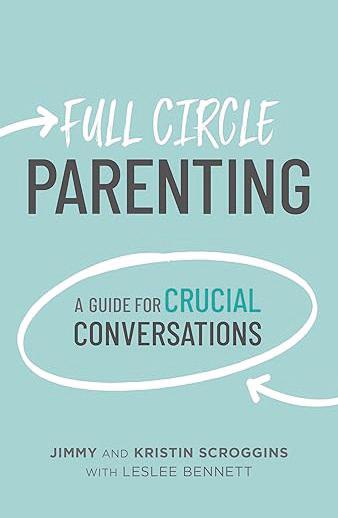
Full Circle Parenting
by Jimmy and Kristin Scroggins
A gospel-shaped guide to parenting hard conversations—equipping moms and dads to address tough topics with truth, clarity, and compassion while keeping the heart of their child and the hope of Christ in view.
conversations are alike. You do not need to search for a formula or a parenting silver bullet—those do not exist. Wisdom does exist, and it is a skill that you can cultivate in your life. This kind of skill helps you to be confident even in tough and tense parenting conversations.
Our Hope Is in the Lord
Parenting is full of off-script moments. We find ourselves embarrassed, discouraged, worn out, or afraid. We put all of our hope in our children following our script, and when they do not, we feel hopeless. We say, “This isn’t working out as we planned.” Or even if it does work out, we say, “What if it doesn’t last?” We begin to fear and doubt and long for a better plan. In those parenting moments, we acknowledge that we need something more, something bigger, someone to put our hope in who will not fail us.
There was a time when our parenting confidence was sky-high. We thought we could manage, control, and scheme enough to avoid big struggles with our children. When you have eight children, you learn quickly that they are all so different. Those of you who have multiple children know what we mean. You figure out that certain ones are going to be easier to parent than others. Some are more compliant and teachable, while others want to figure everything out on their own (which, for the Scroggins kids, means doing it the hard way).
We are all tempted to put our hope in things or people other than God. Some of you may have lost hope entirely as you have watched your children sin or struggle. We pray the words of Psalm 130 will remind you that God is with you.
My Soul Waits for the Lord A Song of Ascents.
Out of the depths I cry to you, O Lord!
O Lord, hear my voice!
Let your ears be attentive to the voice of my pleas for mercy!
If you, O Lord, should mark iniquities, O Lord, who could stand?
But with you there is forgiveness, that you may be feared.
I wait for the Lord, my soul waits, and in his word I hope; my soul waits for the Lord more than watchmen for the morning, more than watchmen for the morning.
O Israel, hope in the Lord! For with the Lord there is steadfast love, and with him is plentiful redemption. And he will redeem Israel from all his iniquities. (Psalm 130)
He has plans for you that are true and sure. God’s redemptive plan that he unveiled for the children of Israel is the same plan he offers to you and your children. Through the gospel, God makes a way out of brokenness, allowing us to recover and pursue his design. Remember, the goal is heart transformation, not behavior modification.
God has called us to be the ones who train our kids to know and follow him. This is why it’s so important for us to remind ourselves that God’s design for parenting is rooted in God’s love, revealed through his wisdom, and sustained as we put our hope in him alone.
Knowing, believing, and living out these principles will prepare us for what comes next, managing our children’s complexity and having a lifetime of crucial conversations.
Adapted from Full Circle Parenting: A Guide for Crucial Conversations © Copyright
July 2024. Published by B&H Publishing, Nashville, TN. Used by permission of the publisher. All rights reserved.

Uncompromising Rigor, Unmatched Access
The New ONLINE PhD in Christian Studies from Southern Seminary
Southern Seminary is proud to introduce our new online PhD in Christian Studies, tailored for ministry leaders and pastors who are passionate about both scholarship and practical ministry.
This program provides a new opportunity to engage in rigorous academic study completely online. The PhD in Christian Studies combines the flexibility of online learning with the rigorous academic standards that Southern Seminary is known for, making it accessible to leaders worldwide.
While he was still speaking to the people, behold, his mother and his brothers stood outside, asking to speak to him. But he replied to the man who told him, “Who is my mother, and who are my brothers?” And stretching out his hand toward his disciples, he said, “Here are my mother and my brothers! For whoever does the will of my Father in heaven is my brother and sister and mother.
MATTHEW 12:46–50
A Conversation with Abigail Shrier and Albert Mohler
Bad Therapy, Cultural Seduction, and Children in Crisis
Abigail Schreier is a journalist and a New York Times bestselling author. She’s known especially for her 2020 book, Irreversible Damage: The Transgender Craze Seducing Our Daughters. And now her latest book, Bad Therapy: Why the Kids Aren’t Growing Up. She holds the baccalaureate degree from Columbia University. A bachelor of philosophy from the University of Oxford and a law degree from the Yale Law School. Her work has been featured in such journals as City Journal and the American Spectator, as well as her regular substack entitled The Truth Fairy. It is her most recent book, Bad Therapy: Why the Kids Aren’t Growing Up, that is the topic of our conversation today.
MOHLER You have written a deliberately provocative book, and I appreciate that. It shows a lot of courage, but you clearly are provoked. I want to start by asking you, why this book right now? Why you?
SHRIER I’m raising three kids in this rising generation, and I always start a book with a question. The question that has been with me since I started having kids was, Why are they so unhappy? Why are they so thoroughly diagnosed? Why does every kid have ADHD or oppositional defiant disorder? Why is every kid talking about their anxiety? What is going on? So I really wanted to understand this socalled mental health crisis—its origins and why it’s happening now.
Why me? That’s a great question. I think it’s because therapy and therapeutic culture have been so thoroughly unquestioned and sacrosanct in our society that it took someone willing to ask, Are they actually doing a good job? Was all this medication, treatment, and therapy actually improving things? And that turned out to be a question many in the mental health industry weren’t comfortable asking.
MOHLER And for good reason. They have a commercial interest in this. People talk about therapy as if it’s about helping people, but frankly, it’s massive insurance compensation. It’s big business.
SHRIER It is. But I think a lot of people have made it into their religion. They don’t seek out a pastor, priest, or rabbi—they go to the therapist. That’s just understood, even among religious Americans. And what many people don’t realize is that when you set a
child up for therapy, there is a known body of harms that therapy can introduce. Those are established in the literature, but people ignore them.
One major issue is that informal relationships—going to an aunt, a pastor, a mother, or a grandmother— are seen as somehow suspicious. We’ve come to believe that only an expert can help. But here’s a big difference: At some point, a grandmother or an aunt is going to say to a child, Go play. You’re fine. A therapist won’t say that, and that’s one of the biggest problems with therapy for kids.
MOHLER I want to push back in time a little bit. As an intellectual historian, I can say this is a conversation that would have been inconceivable 100 years ago. No one would have known what we’re talking about. This is something entirely modern.
SHRIER It is. It went from something that was nonexistent to something unquestioned. Even in the 1980s and 1990s, therapy was frowned upon—it was something for people with problems. Today, it’s so thoroughly accepted that people don’t believe it could have any harms. But any intervention that has the power to help also has the power to introduce risk.
MOHLER You deal with this in the book, but a major part of the cultural messaging now is that therapy is about recovering something bad that must have happened to you. The assumption is that any problem in adulthood must be due to childhood trauma.
SHRIER That’s one of the most pernicious ideas to enter the culture. Popular therapists promote this idea—Bessel van der Kolk’s The Body Keeps the Score is a major example. But it’s essentially repressed memory theory, warmed over. If someone is having trouble
holding down a job or dealing with substance abuse, they’re told, You must have had childhood trauma. We just have to uncover it.
The problem is that it’s based on shaky scientific foundations. Studies show that believing you had childhood trauma—irrespective of whether anything actually happened—makes you more likely to struggle with mental health in adulthood. The belief itself is a vulnerability factor.
MOHLER What’s the distinction between normal childhood and traumatic childhood? I’m not denying there’s a difference, but how do you frame that in your thinking?
SHRIER A wonderful researcher, George Bonanno, talks about potentially traumatic events. He shows that most things we assume to be traumatic don’t actually leave an imprint. Humans are built for resilience. Death of a parent, losing someone in 9/11— these are horrific, but the overwhelming response is resilience.
However, if you believe you were traumatized, even if nothing objectively terrible happened, you are more likely to suffer from adult psychopathology. It’s the belief that becomes the problem.
MOHLER You discuss building resilience in children, which I greatly appreciate. But to be a child is to suffer disappointments. Today, there seems to be an absolute resentment of the idea that there could be such a thing as a happy family.
SHRIER Exactly. The problem isn’t that some children experience real trauma. The problem is that we’re treating all children as if they are fragile and
disabled. Healthy young Americans are asking for mental health days off of work. The problem is that we’re convincing them they are unwell.
MOHLER You take on a major myth in this book— the idea that everything was fine until COVID, and then suddenly children became fragile.
SHRIER That’s absolutely false. Adolescent mental health has been in decline since the 1950s. Yes, COVID lockdowns were bad for kids, but we already had record-high suicide rates before COVID. The smartphone is also a factor, but the bigger issue is that we’ve created unhealthy lives for children. Then we pour in mental health resources, expecting it to fix everything. But the real problem is the absence of independence, community, and parents asserting authority.
MOHLER Let’s talk about schools. You document how therapy has been institutionalized into education. Can parents reverse this trend?
SHRIER Absolutely. The mental health framework in schools encourages kids to dwell on their distress. We see social-emotional learning programs that ask kids to focus on their pain before a math test. This actually encourages rumination, which is the number one symptom of depression.
If parents stood up and said, No, my child does not need to sit in a classroom discussing their pain instead of doing math, things would change. And by the way, if you’re wondering what would be better than social-emotional learning? Literally anything. Playing basketball, painting the gym, picking up trash— anything that directs children outward is better than sitting around analyzing their emotions.
MOHLER In many universities today, you have an enormous administrative bloat because of the therapeutic model. Some universities have a one-tofour ratio of students to administrators. That seems like a direct consequence of this mindset.
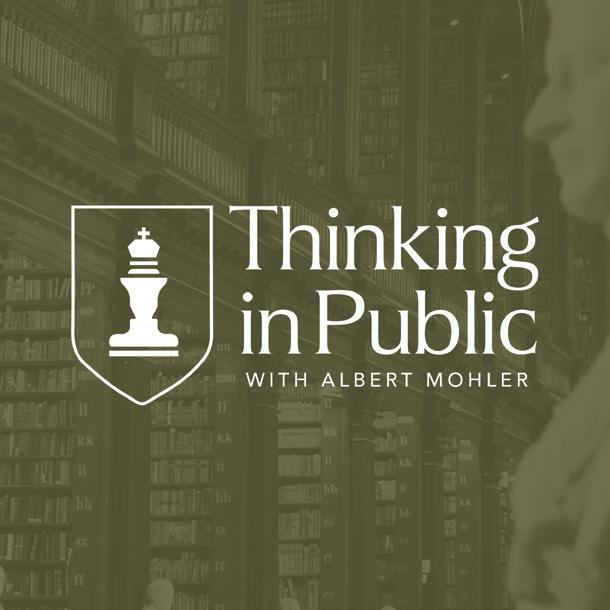
This excerpt is taken from a conversation between Albert Mohler and Abigail Shrier on Thinking in Public, a podcast exploring theological and cultural issues. To listen to this episode and hundreds more visit ALBERTMOHLER.COM/THINKINGINPUBLIC.
SHRIER Absolutely. We have told healthy children to jump into wheelchairs, and now we wonder why their muscles have atrophied. Universities now cater to fragility instead of preparing students for life.
MOHLER You wrote Irreversible Damage, which exposed the moral scandal of gender ideology. Now, with Bad Therapy, you’re tackling another sacred cow. What’s next?
SHRIER I’m not sure yet, but I’ll likely return to something related to the rising generation. I want to help parents, because they have an incredibly difficult job today. They are trying to raise strong, resilient children in a culture that constantly tells them they are fragile.
MOHLER Your book gives parents something rare: common sense. It encourages them to step back from the chaos and say, No, I am the parent, and I will raise my child to be strong. I appreciate that.
SHRIER Thank you. That’s exactly my hope.
A Conversation with John-Michael Bout
How Into the Light Equips the Church to Fight Pornography
Into The Light Ministries, co-founded by John-Michael Bout and Jacob Valk, is dedicated to equipping the church to fight the pervasive issue of pornography through gospelcentered resources. Currently pursuing an M.Div. at the Southern Baptist Theological Seminary in Louisville, Kentucky, Bout has a deep passion for addressing this crisis within the church. The Following interview explores the beginnings and mission of Into The Light and how Bout wants to help the church stand firm against porn.
WHAT DREW YOU TO ADDRESS THE ISSUE OF PORNOGRAPHY IN THE CHURCH?
Sexual sin is the most obvious burning housefire that every church and family has to face. The average age of exposure to porn is age eight, and I am a living statistic. Despite growing up in an incredible gospelbelieving home with parents who love the Lord, I was exposed to porn at age eight. That addiction went on for almost a decade. In my later teen years, God graciously allowed me to start spending time with some older godly friends. That was when I first opened up, confessed my sin, and started to see real heart change. After a couple of years of fighting and growing, I began to walk in consistent freedom and to regularly share my story. I have since walked alongside many other guys and heard dozens of stories of change. It has been one of the greatest joys of my life to see how the gospel can break into incredibly broken situations and transform them. My life is a testimony to that.
WHAT IS INTO THE LIGHT DOING TO HELP CHRISTIANS AND CHURCHES NAVIGATE THIS ISSUE?
Into The Light Ministries produces story-driven resources on biblical sexuality so that the church and family are equipped to delight in God’s good design and face sexual sin. Our aim is to equip strugglers, pastors, counselors, and parents to accessibly address sexual sin. We have four primary resources freely available on our website.
First, Into The Light is a teaching documentary on freedom from pornography that walks through the fundamentals of change from bondage in sin to freedom in Christ. The documentary is a hope-filled, Gospel-centered resource for individuals and churches featuring Jeremy Pierre, Jenny Solomon, Heath Lambert, Deepak Reju, Ellen Dykas, Garrett Kell, and David Platt. We offer an accompanying workbook with discussion questions, homework, space for notes, and recommended resources.
Second, Parenting & Pornography is a nine-episode masterclass series that equips parents to talk to their children about God’s good design for sexuality and the dangers of pornography. Albert Mohler, Abbie Halberstadt, Jonathan Holmes, Andrew Walker, Julie Lowe, and Justin Earley speak in the series, and again, we offer an accompanying workbook with discussion questions, homework, space for notes, and recommended resources.
Third, TechSafe is a set of practical tutorials for protecting every device in your home from explicit content. It walks through potential danger points for phones, computers, tablets, smart TVs, gaming consoles, and smartwatches and how you can filter, monitor, or block them all. These tutorials will equip you to safely live with and enjoy your technology to the glory of God.
Fourth, the Into The Light podcast offers long-form interviews on biblical sexuality and the Christian life with guests like Albert Moher, David Platt, and Deepak Reju. The podcast addresses topics like masturbation, accountability, IVF, and how to help spouses hurt through porn use.
We are building an ever-growing library of accessible story-driven resources to serve pastors, parents, strugglers, and counselors.
WHAT ROLE SHOULD CHURCHES PLAY IN THE BATTLE AGAINST PORN?
The church is the one institution that God has established and chosen to grow us in. Unfortunately, many churches chose to ship out or delegate the role of counseling sexual sin. This is why Into The Light produces resources, not a program. We want to see local churches, elders, moms/dads, and normal people in the pew doing spiritual good in each other’s lives.
Sexual sin can be complex and messy, but that is why we offer resources. We want to equip the church to be the active agent fighting the battle against pornography. One primary way churches can do that is by equipping families to flourish. When moms and dads speak early and often about God’s good design and the dangers of sexual sin, then whole church communities begin to be unified in the fight. We aim to offer free resources that equip Christians to delight in God’s good design and face sexual sin.
HOW DO YOU ENVISION THE FUTURE OF CHRISTIANS AND PORN? IS IT AN ISSUE THAT WILL BECOME MORE SEVERE OR DO YOU HAVE HOPE THAT CHURCHES WILL TAKE STEPS TOWARD OVERCOMING PORN?
The Devil has been attacking God’s good design for sexuality since the fall. So that is not new. However, today he weaponizes technology like we have never seen before. In 2025, an eight-year-old can pull out their phone and immediately access more destructive explicit material than the richest prince in all of history could have seen in his life. Sadly, I do think that there is room for the problem to get worse, particularly with AI and VR. However, there are also encouraging signs right now. Some states are passing restrictions or even outright bans on porn sites. There is a growing number of secular people who are recognizing the damaging effects of porn. And ultimately, we are in the hands of our sovereign King Jesus. We don’t need to be anxious or fearful about the future, whether it looks better or bleak.
WHAT WOULD YOU SAY TO A PERSON STRUGGLING WITH PORN ADDICTION AND THE LEADERS WHO WANT TO HELP THEM?
First, to the struggler, I would say one simple thing. Sin thrives in the darkness. You will not make any serious progress in the fight against pornography if you try to do this alone. James 5:16 invites you to confess your sins to a brother or, if you are a woman struggling, a sister in your church. That is where change begins. Ask someone today to get coffee with you and share what has been going on. You could ask them to read through a book or work through the Into The Light video series and workbook with you.
To the person who desires to help, praise God for your desire to serve. We desperately need men and women to walk alongside those who are struggling with sexual sin. One of the biggest problems I come across is that strugglers can’t find helpers to invest in them. You have an incredible opportunity to make an eternal impact by walking alongside someone struggling with pornography. Make yourself available to those struggling in your church, and consider bringing resources to your pastors to help lift their counseling burden. If you have any questions on how to do this, reach out to us on our website.
Deployed for Maximum Faithfulness

Boyce College fortifies students in a commitment to a Christian worldview, surrounds them with Christ-like faculty, and fosters a student life experience that instills a culture of discipleship. All so they are sent out for maximum faithfulness to Christ in every area of life. Take the first step towards fulfilling God’s call for maximum faithfulness at BOYCECOLLEGE.COM
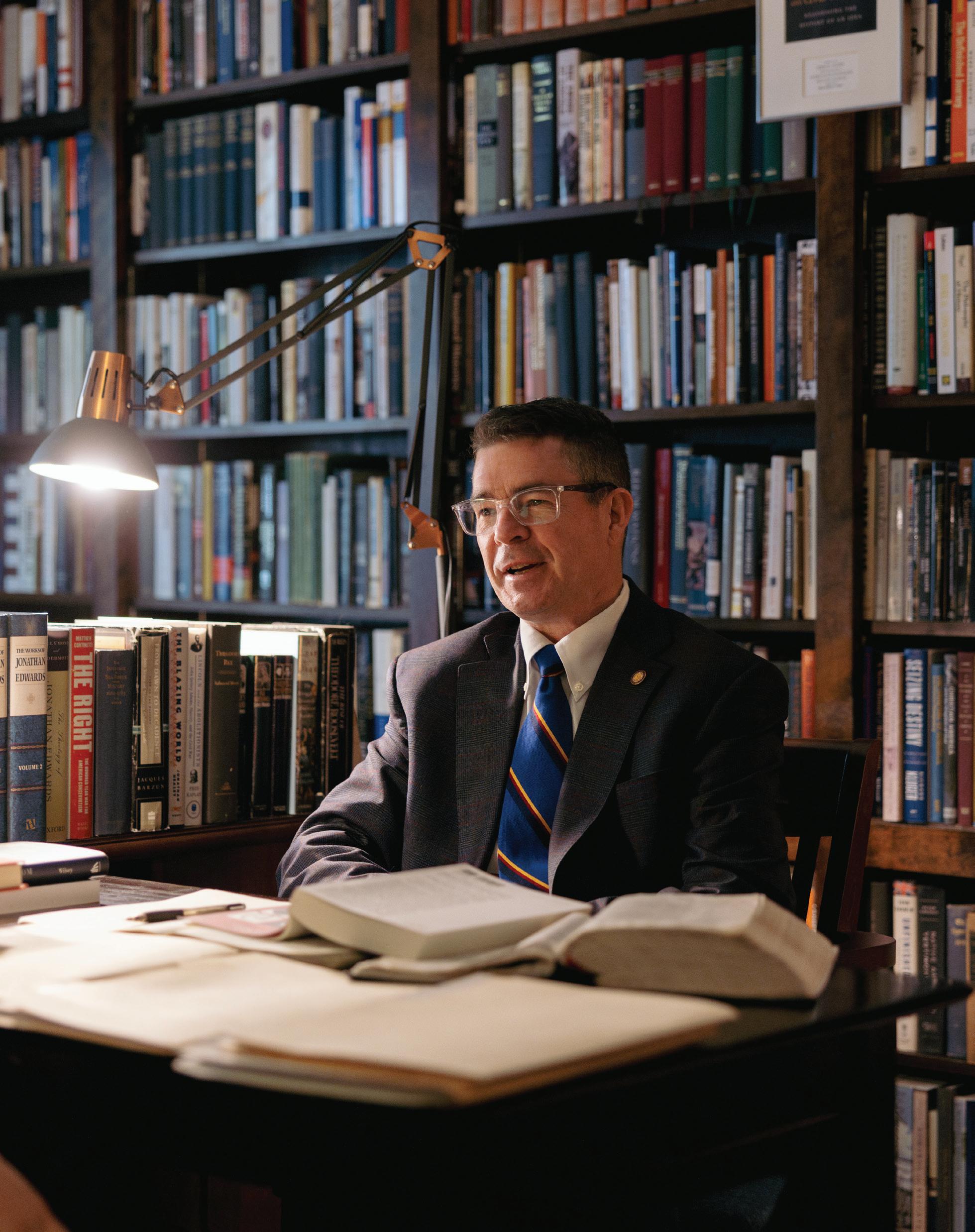
OFFICE HOURS
WITH JOHN WILSEY
John D. Wilsey serves as Professor of Church History and Philosophy and Chair of the Department of Church History and Historical Theology at The Southern Baptist Theological Seminary. Since his days as an undergraduate student, Wilsey has wedded two desires: history and teaching. His latest book, Religious Freedom: A Conservative Primer, represents a lifetime of studying the past and a burden to train up younger generations to think historically.
Wilsey wears many hats—husband, father, pastor, historian, philosopher, outdoorsman, but his role as a teacher is an extension of each of these descriptors. As his students will testify, there is no separating Wilsey the man from Wilsey the teacher. He teaches with his loves ordered, to God first, and from that primary love, his family and the church. When he steps into the classroom, two things are immediately evident—he loves history, and he loves his students enough to teach them to think historically. The following interview captures those loves.
WHY DID YOU BECOME A TEACHER?
I think my heart for teaching came from my grandfather, whose picture hangs in my office. In my relationship with my grandfather, I discovered a love for history and a love for ideas. I was devoted to him and learned everything I could from him. After he died when I was a junior in college, that’s when I realized I wanted to teach. I wanted to share a love of the subject of history with students in the same way that he shared it with me. His love for history was infectious and I wanted to be that way. I wanted to share an infectious love for the subject with others. And so he was my primary inspiration. By the time I was a senior in college and getting ready to graduate, I knew that I wanted to make teaching my life’s work.
HOW DID YOUR TEACHING CAREER GET STARTED?
My first job at college was as a Christian school in rural Caroline County, Virginia. I taught third and fourth grade, and also seventh and eighth grade. At that school, I became the school principal. We met in the basement of an old church that was founded in 1773. The church building had actually been used in Ulysses S. Grant’s Overland Campaign during the Civil War. Grant used the church building as a stable right before the Battle of North Anna, which was just a few miles down the road from where our church was.
I also taught in Raleigh, North Carolina at Regent School of Raleigh. It’s called Trinity now, but I taught middle school there and taught fifth grade as well. I taught in Charlottesville, Virginia, at a classical Christian school. And I taught for Veritas for Scholars Academy, which is an online school. I also taught
homeschool students and Greek to homeschool students. I got a homeschooler ready for the AP exam at my US history exam one time, one year. So that was all before I became an academic.
WHAT DO YOU WANT STUDENTS TAKING ONE OF YOUR COURSES TO WALK AWAY WITH?
I hope that they come to learn how to think historically. That’s what I want them to learn. I want them to love history, but loving history is easy. There’s so much to love about history. But I want them to think historically as an expression of being created in the image of God, and because our Christian faith is a historical faith. It’s rooted in history; it’s rooted in real-time. And so I want my students to think historically and to think Christianly.
WHAT DOES IT MEAN TO THINK HISTORICALLY?
Well, I always give the five Cs of historical thinking, which are good practical ways of thinking about the past: context, change over time, contingency, complexity, and causality. But I also want to teach them to think about the past virtuously. We need to exercise virtue in thinking about the past because the past is inhabited by real people who had real lives. They had real failings and real successes, just like us. So, to think historically also employs the theological virtues of faith, hope and love, and the cardinal virtues of temperance, justice, wisdom and courage. We do receive some virtues from the study of history, but you have to bring virtue to the study of history if you want to make sense of it.
WHAT MAKES YOU LIKE TEACHING AT SOUTHERN SEMINARY SPECIFICALLY?
By far, the best part about teaching at Southern is the students. The students are curious. The students are fun, the students are spiritual students. They keep me young. It’s so great to teach here because of them.
Your MDiv: Incentivized
SAVE MONEY AND TIME BY STUDYING IN LOUISVILLE.
Master of Divinity students who prepare for ministry by studying on the Southern Seminary campus can save $1,800 each semester in tuition. Residential MDiv students now pay for only the first 9 hours per semester and may take as many additional courses as they want for free!
By spending more time in the classroom, you’ll be spending less money in tuition, and graduating sooner than you expect. Southern Seminary is making it more affordable than ever to prepare for a lifetime of faithfulness.

Explore how incentivizing your Southern MDiv helps accomplish your ministry goals at sbts.edu/newmdiv
IN PRINT
The fear of the LORD is the beginning of knowledge; fools despise wisdom and instruction.
PROVERBS 1:7
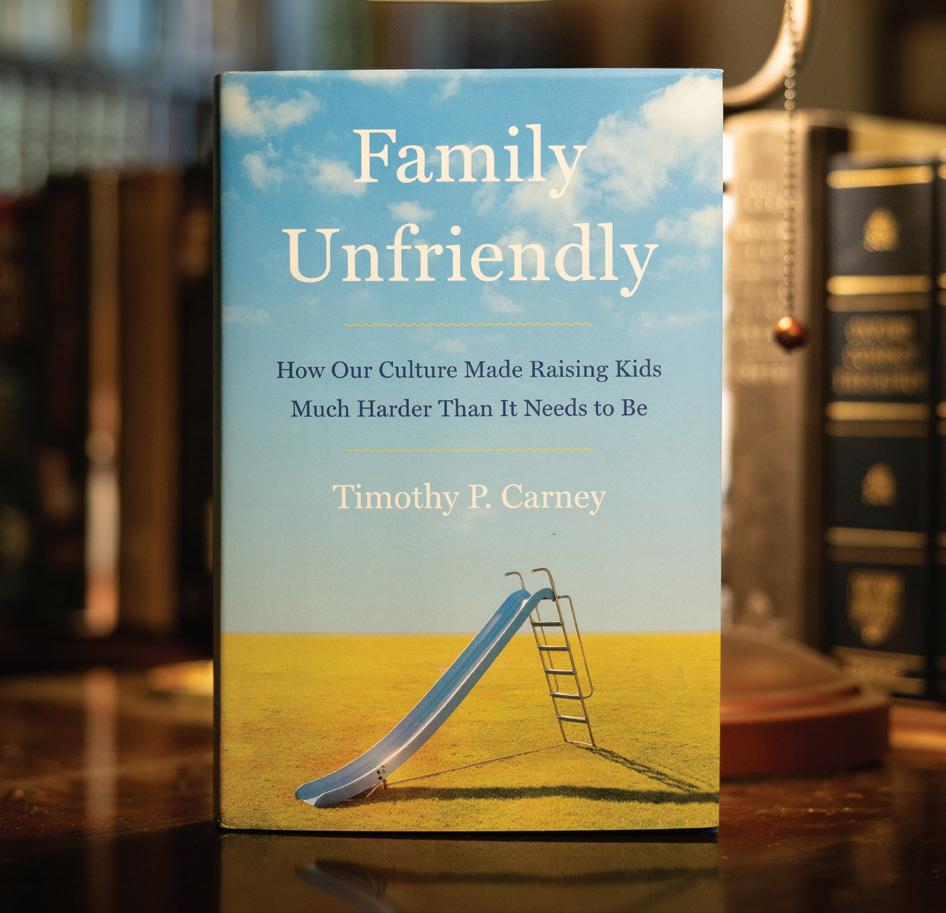
A Book Review by John Wilsey
Family Unfriendly
How Our Culture Made Raising Kids Much Harder Than It Needs to Be
by Timothy P. Carney
$29.99
Between May 1831 and February 1832, a French aristocrat toured America on an official visit to study prisons. Unofficially, he sought to observe the patterns of American democratic life so that he could produce a book tracing the outlines of those patterns. The French had suffered a bloody revolution that had resulted in political, religious, social, economic, and military upheaval since its beginning in 1789. The Americans also had a revolution that altered political, religious, and economic patterns, but in contrast to the French, stability and prosperity were the result rather than chaos, regicide, and tyranny. Alexis de Tocqueville was curious to find out some of the reasons why stability emerged from the Americans’ experience of revolution, and whether the French might learn some beneficial lessons from them. His classic book, Democracy in America, represented the fruit of his observations and analyses of American political and social institutions and habits.
Among many conclusions at which Tocqueville arrived, one of his primary explanations of the success of the American democratic experiment was threefold—(1) that Providence had set the American nation up in the Western Hemisphere, far from European meddling, (2) that American laws prevented concentration of power through federalism, the autonomy of the townships, and the independence of the judicial power, and (3) the Americans had cultivated healthy mores, or customs, based primarily in the Christian ethical tradition. Tocqueville defined mores as “habits of the heart” and “the whole moral and intellectual state of a people.” Tocqueville did not provide a list of American mores in Democracy, but he did identify religion as the chief influencer of the mores. Religion, according to Tocqueville, “directs mores, and it is in regulating the family that it works to regulate the state.” Laws, Tocqueville wrote, were more important than the geographic advantages America enjoyed, but mores were more important to
HARPERCOLLINS
American cultural stability, health, and prosperity than the laws. In fact, the mores informed the laws, gave them form, and made them justly applicable. Mores were so central to the flourishing of American culture, that Tocqueville said, “If in the course of this work, I have not succeeded in making the reader feel the importance that I attribute to the practical experience of the Americans, to their habits, to their opinions—in a word, to their mores—in the maintenance of their laws, I have missed the principal goal that I proposed for myself in writing it.”
For Tocqueville, American culture was directly shaped by mores, and mores emerged from Christian morality and were cultivated in the family. The family was thus the fundamental building block of American society and culture, the indispensable frame of reference for the American way of life.
Timothy Carney argues in his book, Family Unfriendly: How Our Culture Made Raising Kids Much Harder Than It Needs to Be, that American culture has turned against the family. Through impossible parenting standards, socially isolating tendencies, the decline in birth rates, the rise of social media, the ubiquity of screens, the threat of easily accessible pornography, the tyranny and antihumanism of the feminist movement, the myth of freedom that is supposed to come with childlessness, and the extreme pessimism that comes with sterility, contemporary American culture has turned the formation
of healthy, happy families and the raising of well-adjusted children into a near impossibility, a gargantuan task requiring extreme intentionality and vigilance. American culture in the first quarter of the twenty-first century is as unlike that of the first quarter of the nineteenth century as can be imagined. Tocqueville was right that mores have a more direct bearing on culture than laws. The mores of American culture in the 2020s, however, are more influenced by secularism, materialism, antihumanism, an inordinate faith in technology, and an obsession with self-centered comfort and wealthacquisition than Christian morality. Whereas American culture of the 1830s was centered on the family as the basic unit of society, contemporary American culture is centered on the individual, and specifically, individual happiness based on short-term, selfish interest.
In just over 300 pages and fourteen chapters, Carney paints a sad picture of the state of American culture and the place of the family in that culture. Based largely on his own experiences as a father of six children, Carney describes the plight of families who face pressure to prepare children for impossible goals, thereby denying them the simple pleasures of childhood and the independence necessary to develop psychological and physical skills to navigate the real world. The culture has raised expectations of parents, too, demanding that they incessantly helicopter-parent their children, endure “car hell” as they go
Whereas American culture of the 1830s was centered on the family as the basic unit of society, contemporary American culture is centered on the individual, and specifically, individual happiness based on short-term, selfish interest.
Carney’s book is necessary reading, not only for mothers and fathers who are raising children, but also for anyone who cares about the future of civilization.
from activity to activity, and provide them with tech that threatens to hook them on porn and make them stupid and neurotic. Raising children is no longer seen as the purpose for which we are made, but an unnecessary burden, an inhibitor to one’s own financial or professional advancement, an obstacle to cultivating a sense of personal worth and freedom. The result is that the nation’s and the world’s population can no longer replace itself, which will render the very economic flourishing so central to American conceptions of happiness impossible.
Living in the moment, shortsightedness, a refusal to take the long view of things, and a neglect of the handing down of tradition as a sacred trust to children and grandchildren— these are the hallmarks of American culture that fundamentally discourage the development of the family. This is not a sustainable situation. A civilization is built upon families, not individuals. Social, intellectual, physical, spiritual, psychological—and yes, financial—welfare are all learned in the context of home and family. Children learn their place in the family hierarchy from infancy. They learn that they are not equal to the father and the mother. Children do not have the authority to chide their parents, but parents have the authority and the responsibility to correct their children when they break family rules or biblical mandates. Younger sisters and brothers do not have the position of seniority in the family that older sisters and
brothers enjoy, nor do they have the unique duties that seniority entails. Children grow in independence and freedom and learn the connections between privileges and rights on the one hand, and responsibilities and obligations on the other. They come to understand the power of consequences for their actions—punishments when they disobey Mother and Father, and rewards when they set their paths aright. By the time children grow into young adulthood, they are morally, emotionally, and intellectually prepared to take their place as responsible citizens in their town, state, and nation and congregants in their local churches. If individuals become understood as the basis of society, then how is ordered liberty to be learned? What constraints are placed on the heart and the mind, preventing the individual from pursuing their own interests even at the expense of others’ interests and needs? How are public and private goods to be pursued in balanced ways if the family is replaced by the individual as pre-eminent in society? Carney’s book is necessary reading, not only for mothers and fathers who are raising children, but also for anyone who cares about the future of civilization. The value of Carney’s book is that it is a civilizational work, not merely a salvo in the culture war. A feature of sinful human nature is that we forget the benefits we receive from the gracious hand of God. If we are not careful, we who live and flourish today can reach the point at
which we take our civilization and its benefits for granted. As things have been and are now, they will always be. Our children will enjoy the same freedoms and duties in their lives that graced and dignified our own, because, why not? But civilization consists of a stewardship. We steward the traditions handed down to us by our own ancestors. The traditions of voluntarily associating together in civic groups like neighborhood baseball leagues; the cultivation of relationships within the broader family circle of aunts, uncles, cousins, grandmothers, and grandfathers; the handing down of skills and loves like fishing, hunting, working on cars, carpentry, and any number of honed proficiencies passed down from fathers and mothers to children; and the most basic tradition of all—the tradition of children growing up, getting married, having their own children, and passing down Christian, national, and familial habits, conventions, and beliefs from one generation to the next. On the one hand, the receiving and handing down of tradition is one of the great blessings entailed in the institution of the family. On the other hand, if the family is undermined and ultimately destroyed, then how can civilization survive?
Carney offers practical solutions to the challenges presented by a family-unfriendly culture. Stop expecting the impossible of your children and of yourself as a parent. Get married and have large families. Cultivate connections with relatives beyond the nuclear family. Get involved with others outside your family circle. Guard your children’s hearts and minds by making technology your slave, not being a slave to technology. These and the many other principles of living a satisfying life are wisely offered by Carney in his book.
By cultivating your own family, you begin to create, by small steps, a culture that is family-friendly. Mores do not originate from the top of society and work their way down through coercion or legal processes and pressures. Mores do not come from political leaders or political partisan gamesmanship. They originate from the bottom and work their way throughout. To change culture, families take intentional and beneficial steps as they exercise vigilance in the ordinary patterns of their lives. In the long run, we can hope that culture will change, even if those changes do not fully take root in our lifetimes. Ultimately, we do not seek to change culture for our own individual benefit or enjoyment. We do so for the benefit and enjoyment of our children and grandchildren. If we do not steward the good gifts of our civilization, nobody will do so for us. Civilizational work is for all of us.
The latest books from Southern Seminary and Boyce College faculty reflect our enduring commitment to serve the church through scholarship that is faithful, rigorous, and accessible. These works exemplify the kind of theological depth and clarity our students engage with every day in the classroom. At Southern Seminary and Boyce College, you study with the authors.

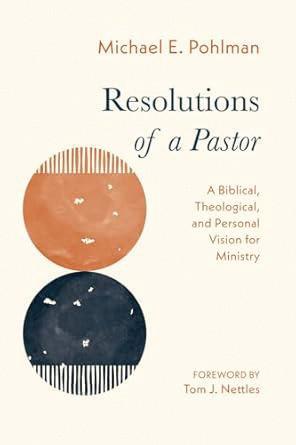
Walking the Way of the Wise: A Biblical Theology of Wisdom (ESBT)
by Mitch Chase IVP ACADEMIC
| $26.00
Walking the Way of the Wise is a profound exploration into the depths of biblical wisdom, seamlessly blending scholarly insight with practical guidance. In this addition to IVP Academic’s Essential Studies in Biblical Theology (ESBT) series, Mitchell Chase invites readers to rediscover wisdom as an essential thread woven throughout the tapestry of Scripture. Chase unveils wisdom not merely as knowledge or cleverness but as a life-giving path of joyful obedience to God’s Word.
Resolutions
of a Pastor: A Biblical, Theological, and Personal Vision for Ministry
by Michael E. Pohlman
WIPF AND STOCK | $28.00
With the promise of numerical growth, pastors are annually bombarded with new leadership techniques and paradigms for ministry. Many of these are influenced more by secular business philosophy, pragmatic thinking, and homespun advice than the Bible. There is no more important institution in the world than the church. And the best way to strengthen the church is to strengthen her shepherds. This is the aim of The Resolutions of a Pastor

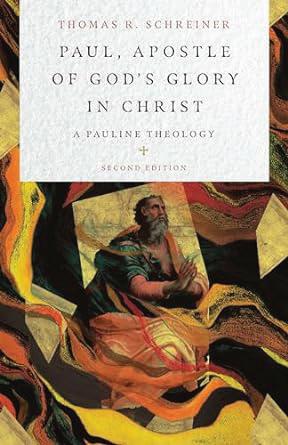
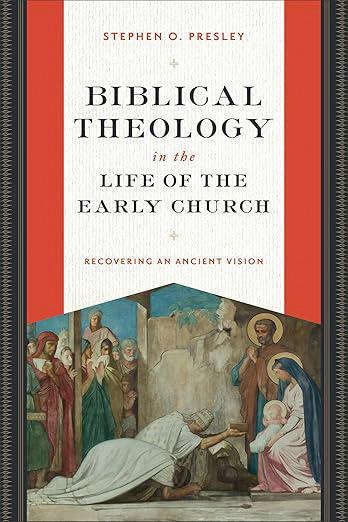
Complementarity: Dignity, Difference, and Interdependence
by Gregg Allison
B&H | $30.89
In Complementarity, theologian Gregg Allison presents a fresh vision for understanding God’s design for men and women as image bearers in the home, the church, and society. As a framework broader than either complementarianism and egalitarianism — and underlying both of them — complementarity affirms the equal dignity, significant difference, and flourishing interdependence of men and women.
Paul, Apostle of God’s Glory in Christ (2nd ed)
by Tom Schreiner
IVP ACADEMIC | $55.99
This second edition is revised throughout and engages with more recent works on Paul. While thoroughly informed by the issues of contemporary Pauline studies, Schreiner offers an accessible account of Paul’s theology that focuses on the primary sources. Paul, Apostle of God’s Glory in Christ remains a sound, insightful, and trusted exposition of Paul’s theology that is well-geared to the needs of seminary students and working pastors.
Biblical Theology in the Life of the Early Church: Recovering an Ancient Vision
by Stephen O. Presley
BAKER ACADEMIC | $24.99
This volume brings patristic biblical interpretation into conversation with contemporary biblical theology, exploring how assumptions and methods of figures such as Irenaeus and Augustine can guide modern hermeneutics. Presley shows how early Christian theologians emphasized virtue and discipleship alongside exegesis, patiently shaping readers to inhabit Scripture’s narrative. He illuminates the catechetical and liturgical scaffolding that informed patristic biblical theology, centered on Christ as the cornerstone.

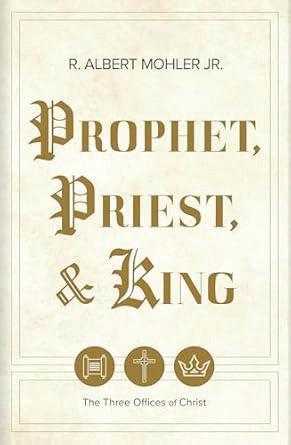
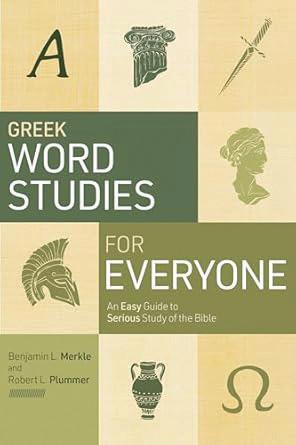
Religious Freedom: A Conservative Primer
by John D. Wilsey EERDMANS
| $28.99
Writing for fellow Americans concerned about threats to religious liberty, Wilsey draws on US history to explain why rather than weaponizing religious freedom in the context of the culture wars, today’s conservatives need to rally around religious freedom to promote peace between church and state. With wisdom and acuity, Wilsey charts a path forward for thinking about and maintaining a uniquely American tradition: the harmony between liberty and religion that each generation has received as an inheritance from the generations preceding theirs.
Prophet, Priest, and King
by R. Albert Mohler Jr.
B&H | $22.99
One of the tensions in contemporary evangelicalism involves an unease over what it means for us to proclaim that Jesus Christ is Lord and King. This latest work by R. Albert Mohler, Jr. helps Christians remain grounded in Christ, being thoroughly informed by his prophetic, priestly, and kingly offices.
Greek Word Studies for Everyone: An Easy Guide to Serious Study of the Bible
by Rob Plummer
B&H | $14.99
Unlock the treasures of Greek word studies with this comprehensive guide! Designed for both laypersons hungry for in-depth biblical knowledge and Christian ministers seeking to refresh and enrich their Greek understanding, Greek Word Studies for Everyone: An Easy Guide to Serious Study of the Bible provides a clear pathway through the complexities of Greek word analysis.

Did the Resurrection Really Happen?
by Timothy Paul Jones
CROSSWAY | $7.99
In this concise booklet, author Timothy Paul Jones addresses the doubts and questions that arise from Jesus’s resurrection as recorded in the New Testament. Jones argues this story is not a mere repetition of old pagan tales or a fabrication to fulfill Jewish expectations. Instead, it was a historical event that is supported by compelling evidence, including accounts of men and women who were willing to die for what they believed they had seen.


Songs of the Son: Reading the Psalms with the Author of Hebrews
by Daniel Stevens
CROSSWAY | $19.99
Songs of the Son explores 9 psalms cited in Hebrews. Each chapter focuses on a single psalm—exploring its role in the argument of the Hebrews, uncovering the psalm’s central themes, and then reexamining the psalm through the lens of Hebrews’ interpretation. Ultimately, readers will gain a better understanding of the Psalter and discover how all Scripture, including the Old Testament, reveals the preincarnate glory of Christ.
Good News for All the Earth
by Mitch Chase
10OFTHOSE | $9.99
The New Testament reports the arrival of God’s promised deliverer. In several Gospels, a book of early church history, many letters, and a visionary book of judgment and hope, we learn about the ministry and mission of Jesus and the lives of those who followed him. The Old Testament contained the shadows and patterns and prophecies that anticipated the Christ, and the New Testament announces that the Light of the world has come. We need to understand the story of the New Testament because it is about the one who changed the world — and who changes us.
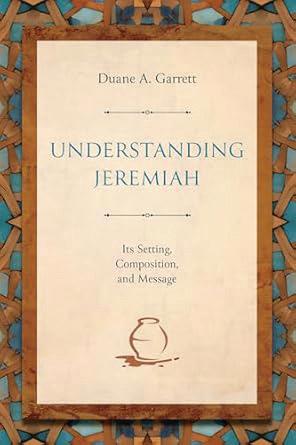
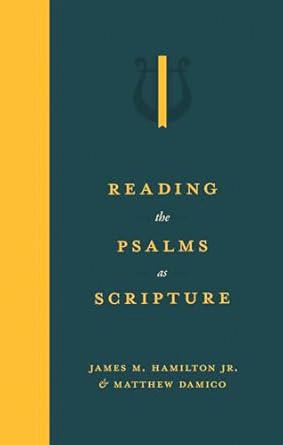
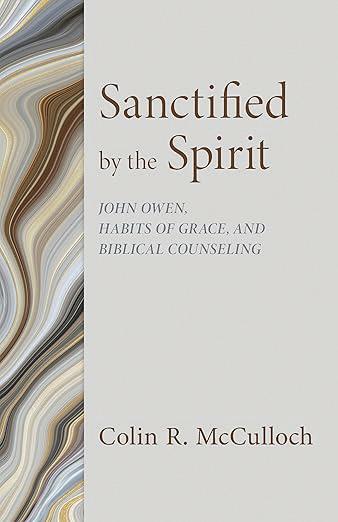
Understanding Jeremiah
by
Duane Garrett
KREGEL | $24.99
The book of Jeremiah is full of beauty and brokenness, joy and sorrow. These themes are interwoven throughout the book, often without context or introduction, which can leave the present reader without the full picture of what the passage conveys. In Understanding Jeremiah: Its Setting, Composition, and Message, author Duane A. Garrett steps back from verse-by-verse commentary to provide a bird’s-eye view of the book, giving rich background information to these prophetic writings.
Reading the Psalms as Scripture
by James
M. Hamilton Jr. & Matt Damico LEXHAM PRESS | $13.99
In Reading the Psalms as Scripture, James M. Hamilton Jr. and Matthew Damico guide the reader to delight in the spiritual artistry of the psalms. Psalms is a carefully arranged book saturated in Scripture. The psalmists drew from imagery and themes from earlier Scripture, which are then developed by later Scripture and fulfilled in Christ.
Sanctified by the Spirit: John Owen, Habits of Grace, and Biblical Counseling
by Colin McCulloch
REFORMATION HERITAGE BOOKS | $30.00
Biblical counselor Colin R. McCulloch retrieves John Owen’s theology of Trinitarian sanctification to address modern concerns in counseling methodology. McCulloch examines two divergent approaches to sanctification within the biblical counseling movement, suggesting that Owen’s emphasis on Spirit-infused habitual grace provides a more holistic vision for soul care.

From Glory to Glory: An Unnatural History of Sanctification
by Abraham Kuruvilla APOLLOS | $39.99
Abraham Kuruvilla informs and equips pastors, preachers and church leaders to focus on God’s work to overcome the sinful flesh in humanity through the agency of the Spirit and through the Spirit’s product: Scripture. These are the ways that God brings His people from glory to ever-increasing glory. This is not a model or plan of action, but rather an invitation towards being conformed to Christlikeness.
FROM LEXINGTON ROAD
Do not be conformed to this world, but be transformed by the renewal of your mind, that by testing you may discern what is the will of God, what is good and acceptable and perfect.
ROMANS 12:2
NEWS
SBTS and 9Marks Team Up to Equip the Church with ‘Bible Talk’ Podcast
by Travis Hearne
The long-running ‘Bible Talk’ podcast, produced by 9Marks, is now an official partner with Southern Seminary. The new collaboration will bring video episodes, in addition to audio, to better serve the church. All three hosts of ‘Bible Talk’ graduated from Southern Seminary and share the seminary’s commitments to biblical and theological faithfulness.
Want to Study Theology? Start with God, Scott Swain says during Julius B. Gay Lecture Series by
Travis Hearne
Southern Seminary recently welcomed noted theologian Scott Swain to campus for the esteemed Julius B. Gay Lecture Series. Swain, President and Professor of Systematic Theology at Reformed Theological Seminary in Orlando, Florida, delivered a compelling series of lectures on the central theme that God himself is the proper subject matter of theology.
God Is Back in 2025? Sean McDowell Delivers Gheens Lectures, Speaks at Student Ministry Workshop by
Travis Hearne
Southern Seminary welcomed Sean McDowell to campus for the annual Gheens Lecture series and to speak at the Student Ministry Workshop on March 25. McDowell serves as Associate Professor of Christian Apologetics at Talbot School of Theology, Biola University, and co-host of the Think Biblically podcast. In his lecture series, “Why God Is Back in 2025,” McDowell addressed the Southern Seminary community about the shifting public conversation on faith.
FEBRUARY 12, 2025
FEBRUARY 10, 2025
MARCH 27, 2025

Boyce College Spring Preview Day Breaks Attendance Record
by Travis Hearne
Boyce College welcomed a record-breaking number of prospective students and their families to campus for its largest Preview Day in history, March 27–28. The excited 381 attendees, including 167 prospective students, explored the academic, spiritual, and community life at Boyce.
Answering the Call to Prepare: Southern Seminary Welcomes Students for Spring Preview Day by
Travis Hearne
The Southern Baptist Theological Seminary hosted 140 prospective students for its Spring Preview Day on April 11, providing an introduction to life, learning, and ministry preparation on campus. Preview Day offered attendees a full day of engagement with Southern’s Christ-centered mission and academic excellence.
APRIL 2, 2025
APRIL 15, 2025
PODCASTS
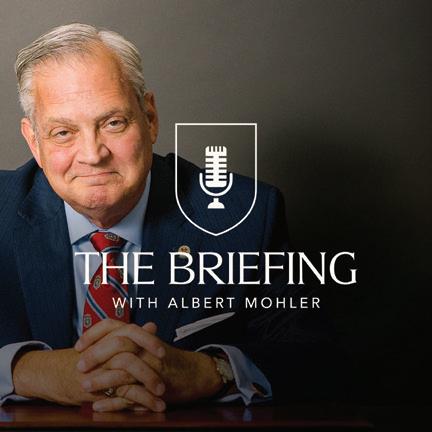
The Briefing with Albert Mohler
The Briefing is a daily analysis of news and events from a Christian worldview. Each weekday, President R. Albert Mohler, Jr. helps listeners think biblically about culture, politics, and the moral challenges of our time.

Thinking in Public
with Albert Mohler
Thinking in Public is a series of conversations with the day’s leading thinkers. In each episode, Dr. Mohler engages writers, scholars, and public intellectuals on the ideas shaping the church and the world.
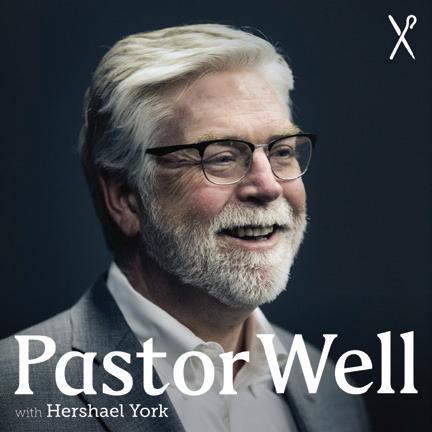
The Pastor Well Podcast with Hershael York
Hosted by Dr. Hershael York, pastor and longtime preaching professor at Southern Seminary, The Pastor Well Podcast offers reflections on ministry drawn from decades of pastoral experience. Available in both audio and video, each episode offers biblical insight and practical encouragement for those called to shepherd the church.
From global missions to biblical theology to cultural analysis, these podcasts reflect the theological depth and Great Commission heartbeat of Southern Seminary and Boyce College.



Faith First Podcast from Boyce College
The Faith First Podcast offers insight, resources, and biblical wisdom for Christians seeking to grow in their faith. Featuring faculty, staff, and friends of Boyce College and Southern Seminary, each episode explores what it means to live faithfully in every area of life. Grounded in a biblical worldview, this podcast reflects Boyce College’s commitment to disciple students who put the faith first.
Amazon to the Himalayas with Paul Akin
Hosted by Dr. Paul Akin, Provost of Southern Seminary, Amazon to the Himalayas highlights the work of the global church and the unstoppable mission of God. Each Wednesday, listeners hear stories from the frontlines and conversations that inspire faithfulness in the Great Commission.
Bible Talk
Bible Talk is a podcast from 9Marks and Southern Seminary. Tune in each week as Jim Hamilton, Sam Emadi, and Alex Duke have accessible conversations about the Bible and biblical theology—showing how the whole Bible fits together and points to Christ.
Learn more at sbts.edu/podcasts
A Chapel Message from Aaron Harvie
Standing Firm in Exile
Aaron Harvie serves as the lead pastor of Highview Baptist Church in Louisville, KY. He preached this sermon in Alumni Chapel on February 25. What follows is a lightly edited transcript prepared for Lexington Road. To watch the full sermon, visit youtube.com/southernseminary.
It’s always a privilege to preach at Southern Seminary. Every time I return, I’m reminded how the Lord calls us not to impress others but to honor His great and holy name. This place carries a weight of gospel faithfulness, and standing behind this pulpit is never something I take lightly. As a pastor, returning to this chapel is both humbling and invigorating—a reminder that God remains faithful through every season of ministry, even as the seasons change.
I remember the first time I preached here. There’s a kind of awe you feel stepping into this room, especially for the first time. And with it, a subtle temptation to perform, to say something impressive. But over time, the fear of man fades. What remains, and grows stronger, is the desire to lift high the name of Jesus.
Today, I want to walk with you through Daniel 1:1–7. At Highview, we’ve been preaching through the book of Daniel, and it has reminded us over
and over again of one central truth: our Lord reigns. Even in moments of darkness, even when the future feels uncertain, God is sovereign. He is not distant. He is not silent. He is present and ruling—even when everything seems to be falling apart.
“In the third year of the reign of Jehoiakim king of Judah, Nebuchadnezzar king of Babylon came to Jerusalem and besieged it. And the Lord gave Jehoiakim king of Judah into his hand…” (Dan. 1:1–2)
The year is 605 B.C. Babylon, led by Nebuchadnezzar, has come to conquer Jerusalem. This was a real event in history, and it was devastating. But look closely—three times in this chapter we see the phrase, “the Lord gave.” That repetition isn’t accidental. This is not random historical chaos; God is sovereign, even over defeat. Nebuchadnezzar may be the human agent, but it is the Lord who has handed over Jehoiakim and the temple vessels.
This defeat was no accident. Prophets like Jeremiah had warned the kings and people of Judah for generations: turn from idols, return to the Lord. But their rebellion persisted. They dismissed the warnings. They rejected the prophets. And now, as judgment—not abandonment, but discipline—God gives them over.
One of the most devastating moments in this passage is the removal of sacred vessels from the temple. These holy items, the treasures of Jerusalem, were carried into the temple of a false god in the land of Shinar. Nebuchadnezzar isn’t just asserting political dominance—he’s making a theological claim: My gods are stronger than yours. Of course, we know it’s not true. But it looks true. And in exile, appearances can be deceiving.
The Enemy’s Strategy
What happens next reveals the enemy’s strategy for conquering not just nations, but hearts. And it’s a strategy still alive and active today. Sinclair Ferguson summarizes it with four observations: isolation, indoctrination, compromise, and confusion.
We see all four in Nebuchadnezzar’s treatment of the young exiles. Daniel and his friends—probably 14 or 15 years old—are taken from their homes, cut off from their families, their faith community, their language, and their place of worship. That’s isolation. Remove them from the environment that shaped their faith.
Then comes indoctrination. They are enrolled in a three-year reeducation program, learning the literature and language of the Chaldeans. This wasn’t a Babylonian liberal arts degree. It was total immersion into a new worldview. Babylon wanted to reshape how they saw reality—what was good, what was true, what was worthy of worship.
Then, compromise. They’re offered food and wine from the king’s table. On the surface, it looks like generosity. But this food had been sacrificed to idols.
Accepting it meant defilement—subtly surrendering their loyalty to a foreign power.
And finally, confusion. Their Hebrew names— each one honoring the God of Israel—are replaced with names that point to Babylonian gods. Their new names attempt to overwrite their identity.
• Daniel (“God is my judge”) becomes Belteshazzar (“Bel’s prince”)
• Hananiah (“Yahweh has been gracious”) becomes Shadrach (“command of Aku”)
• Mishael (“Who is like God?”) becomes Meshach (“Who is what Aku is?”)
• Azariah (“Yahweh has helped”) becomes Abednego (“servant of Nego”)
This was no accident. It was a systematic effort to erase their past, redefine their identity, and reshape their future.
And it’s not hard to see the parallels in our own time. We may not live in ancient Babylon, but we are certainly navigating a digital Babylon. Our culture— especially online—is constantly working to isolate us from community, indoctrinate us with competing worldviews, tempt us into compromise, and confuse us about who we are.
Daniel’s Resolve
So how do we live faithfully in a land that is not our home?
Verse 8 offers the turning point: “But Daniel resolved that he would not defile himself…” That word “resolved” is powerful. It’s not a feeling—it’s a decision. Where does that kind of conviction come from in a teenager?
To answer that, we need to rewind the story. Seventeen years before Babylon’s siege, in 622 B.C., something remarkable happened. During temple renovations under King Josiah, the Book of the Law was rediscovered. It had been lost—gathering dust somewhere in the temple. But when it was read aloud
Our hope is not in our resolve, but in His. Jesus stood firm so that we, weak and wavering, might stand in Him.
to the king, Josiah tore his robes in grief. The nation had drifted, and now, the Word of God confronted them.
What followed was a sweeping reformation. The Scriptures were read publicly. The idols were torn down. The covenant was renewed. And Daniel’s parents were likely shaped by that movement. These young exiles— Daniel, Hananiah, Mishael, Azariah— grew up in homes where the Word of God mattered. That’s where resolve is formed—not in the moment of pressure, but in years of formation.
Daniel doesn’t lash out. He doesn’t mount a protest. He approaches the chief of the eunuchs with humility and proposes a test: let us eat vegetables and drink water for ten days. Then compare us with those eating the king’s food. See what happens.
God honors his resolve. The four young men are found to be healthier and more insightful than all the rest. And behind it all, we see it again: “God gave.” God gave Judah into Nebuchadnezzar’s hands (v.2). God gave Daniel favor (v.9). God gave knowledge and wisdom (v.17). Our God is not passive in exile. He is ruling.
Not Just Moral Heroes
We admire Daniel’s courage. But if all we see is a model to imitate, we’ve missed the point. This is not ultimately about Daniel.
Daniel was taken into exile. Jesus came willingly. Daniel refused to defile himself. Jesus lived in perfect obedience—undefiled, unblemished,
without sin. Daniel stood before earthly kings. Jesus stood condemned before Pilate, the eternal King wrapped in humility. Daniel’s faithfulness preserved his life. Jesus’ faithfulness led Him to death—death on a cross—for sinners like us.
Philippians 2 declares that Jesus, though He was in the form of God, did not count equality with God something to be grasped. He emptied Himself. He became obedient—even to death. Therefore God highly exalted Him. There it is again: God gave. The name above every name was given to Christ.
Romans 8 brings it home: “He who did not spare His own Son but gave Him up for us all, how will He not also with Him graciously give us all things?”
Our hope is not in our resolve, but in His. Jesus stood firm so that we, weak and wavering, might stand in Him.
Daniel 1 ends quietly: “And Daniel was there until the first year of King Cyrus.” That’s seventy years. Long after Nebuchadnezzar was gone, long after empires rose and fell, Daniel remained. Faithfulness in exile is not a moment— it’s a lifetime.
May we have the same resolve. Not rooted in our strength, but in the grace of our King. May we reject isolation, cling to the truth, resist compromise, and find our identity— not in what the world says, but in who Christ is.
Jesus is worthy. He is sovereign. And He is with us.

